#analysis and explanation
Explore tagged Tumblr posts
Text
Simeon’s Journey
Simeon was introduced to us as an angel, not just any angel but an archangel; A warrior angel in charge of legions of angels.
From season one we immediately learn not everything is as it seems with Simeon. Simeon tends to bend the rules, be more relaxed, and was mentioned as having once been a Seraph, the highest rank of angel in the Celestial Realm.
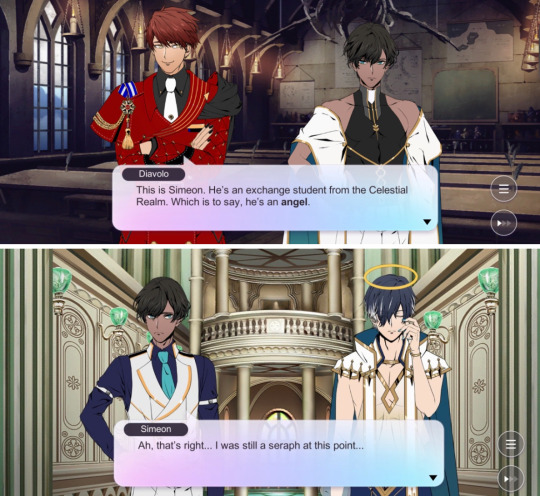
In the Celestial Realm Simeon was a brother to Lucifer. He was given a rose garden by his Father and watched it diligently while having a great interest in a book of prophecy, one that foretold he’d one day lose his wings. Although this concerned Mammon, Simeon wasn’t particularly bothered.
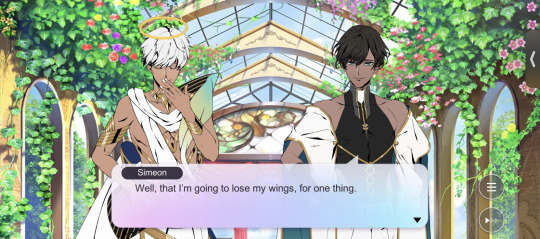
When the war broke out, Simeon tried to cover for the brothers, and for this, he was demoted to Archangel, a busy position where his job was to defend the realm from the frontlines. Gone were the days of rest and relaxation with his family and two close remaining friends, Raphael and Michael.
To cope with the loss of the brothers, Simeon began to write about them, likely using the book of prophecy as a reference since most of his books reflected what would eventually become reality, with the main protagonist, Henry, replacing MC. These books would eventually be published but upon visiting the Devildom and discovering the brothers were so different from how he remembered he became disheartened and didn’t continue his work until Season Four of the game.
Upon coming to the Devildom in season one Simeon was guarded against Diavolo and didn’t particularly like him. He enjoyed scaring Luke, befriended Solomon, and acted as a messenger for Michael.
In season two things take a turn with Simeon. He’s more relaxed and adjusted to the Devildom and doesn’t hide his secretly stern behavior, even bringing Mammon to tears when put in charge of a play he’d write.
When everyone learned MC would likely die from their abundance of uncontrolled power, the ring of light was given up as an option because it was lost in the war. Simeon keeps quiet but immediately leaves to steal the ring from the celestial realm to save MC’s life.
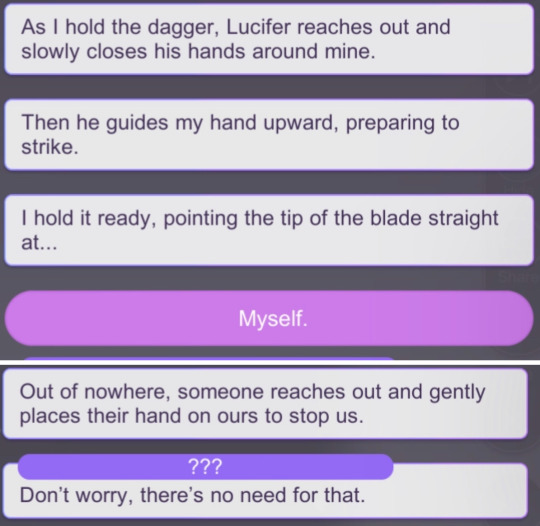
These actions closely resemble Lilith’s choice which started the war with similar results.
Lilith directly altered a human's lifespan which is forbidden, by offering him stolen fruit from the Celestial Realm.
Simeon more or less altered MC’s lifespan by bringing them the one object that could keep them alive. If MC hadn’t died, Lucifer would have, Lucifer who although forgiven, was still a traitor to the realm.
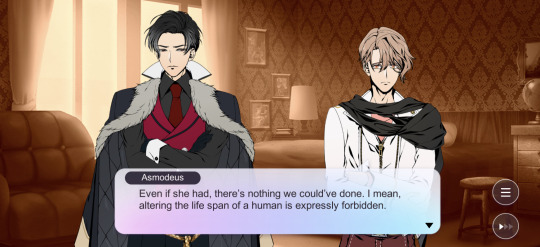
The final chat of season two is Michael asking to speak with Simeon. It’s clear he’s in trouble for what he’s done.
In season three we aren’t shown anything is too different with Simeon although the brothers find it weird that he’s in the human world as it’s not an archangel's job. During his time at the cafe, Simeon meets with Raphael on multiple occasions who is checking on how he is doing as a human.
In season four Simeon comes back to the Devildom, this time as a human exchange student though this fact is only known by Solomon, Raphael, Diavolo, Barbatos, and Lucifer who keep an eye on him to make sure he is safe from other demons.
Now in the Devildom, it’s clear how powerless Simeon is. Unable to protect himself or his loved ones with an angelic blessing, everyone learns the truth. With the truth revealed and his closest friends there to support him, Simeon finally takes the steps towards accepting his new life as a human and even begins to wear his old celestial realm clothing.
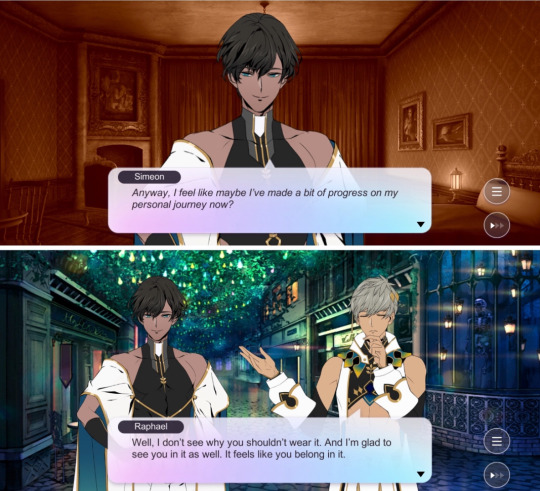
But things don’t end there. Despite his newfound confidence, no more than a few weeks later he becomes sick and unsettled, even missing part of the RAD Science Fair to stay home.
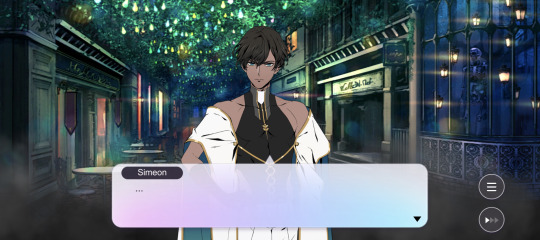
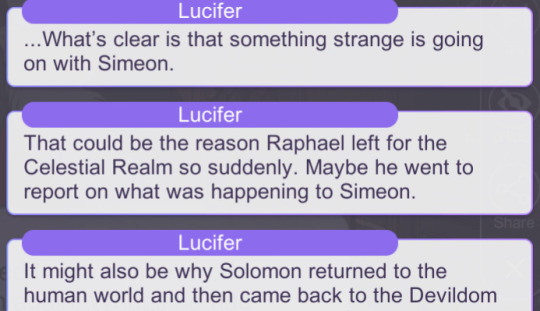
While observing Simeon one day, Lucifer notices his aura has changed and when he confronts Solomon, Solomon reveals that Simeon is turning into a demon and he has been since the human world.
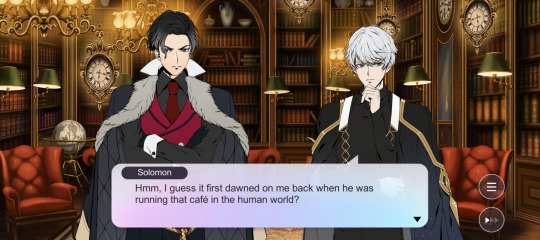
Moments we can see this too in the human world were Simeon’s teasing in the “Celestial Realm”, his threats to the brothers in the cafe, and his confession to Lucifer that he feared his own Father or an aspect of him.
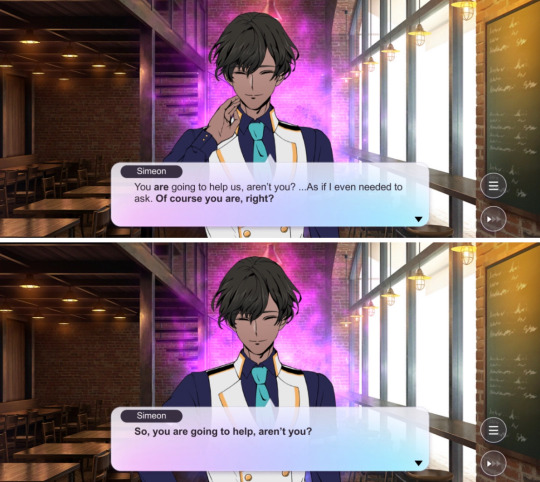
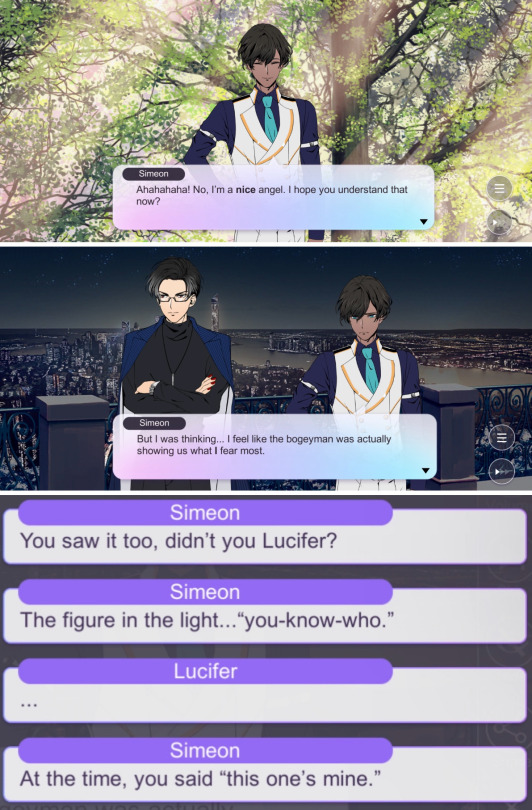
Simeon may not understand what’s happening to him, although he knows his magic is stronger and applauds MC for noticing in chapter 47. Simeon is now forced to make another huge adjustment by becoming a demon, and it’s difficult for the people around him too—after learning Raphael was found staring into space and incorrectly answering questions, even struggling to drink Demonus, which he loves. Michael has been pestering Luke for updates on Simeon, and Luke is now concerned about his condition again.
This will only go a few different ways. Simeon becomes a demon, demon form and all, and perhaps reunites as brother with the other seven, or he’s going to fight against the change to become an angel again as even Raphael states he believes Simeon is better at his “job” than he used to be.
Depending on how Simeon copes with this change, it’s either a tragedy or a new beginning. Simeon has always been disillusioned with his job, even telling MC he believed angels couldn’t have dreams of what they wanted to do, and drunkenly sobbing to Lucifer that he’s now more of a middle management type.
Either way, for Simeon and everyone around him, it’s hardly the ending.
#obey me shall we date#obey me simeon#obey me nightbringer spoilers#obey me nightbringer chapter 48#obey me explanation#obey me shall we date simeon#obey me lucifer#obey me diavolo#obey me solomon#obey me Belphegor#obey celestial realm#obey me celestial war#obey me angels#obey me demons#obey me Lilith#obey me asmodeus#obey me simeon and Michael#obey me Michael and Simeon#obey me lucifer and Simeon#obey me Simeon and Lucifer#obey me Raphael and Simeon#obey me simeon and Raphael#obey me tsl#obey me simeon and Solomon#obey me solomon and Simeon#obey me analysis#obey me Raphael#obey me Michael
1K notes
·
View notes
Text
Nuance, Narratives, and Nosferatu
As of today, Robert Eggers' Nosferatu (2024) has only been in theatres for 4 full days; and, coincidentally, that is about as long as I am able to let my thoughts marinate before they demand to be communicated. Before going into any further detail, let it be known that this film was made by freaks for freaks; it exists for the goths, the gays, the monsterfuckers, the historians, and for all those who delight in moral and thematic complexity.
With that being said - spoilers under the cut!
There are two principal narratives running through the flesh of Nosferatu, both of them rooted heavily in the cultural and literary origins of the story. It is a nightmare; it is also an erotic fantasy. It is horrifying, and it is also achingly romantic. From what I've seen so far, the vast majority of discourse that has already emerged around the film is caused by people misunderstanding or deliberately ignoring the relationship between these different lines of analysis; so please trust me when I say, from the bottom of my heart, that this duality is the very lifeblood of the movie.
The reason for that is, quite simply, that Nosferatu is a gothic horror film, set in 1830s German Confederation; and its plot relies on the same (sometimes contradictory) complexities often displayed in Victorian gothic fiction.
From the beginning of the movie, we are given to understand that Ellen Hutter met Count Orlok - the eponymous nosferatu - psychically, when she was very young. They spoke, she pledged herself to him, and was horrified to realize what she had done when he revealed his true visage to her in their first visual (and sexual) encounter.
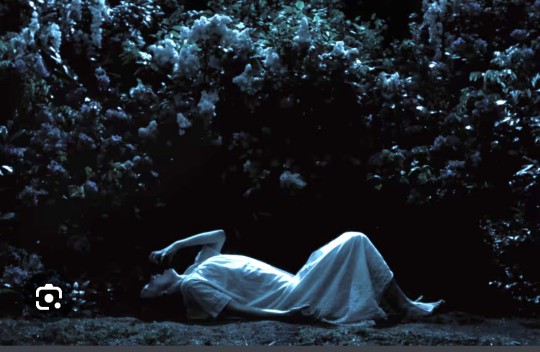
Here, under the lilacs, the paths diverge.
The first reading of the film is perhaps the more straightforward. A young girl is essentially catfished and groomed by a much older, dangerous man. When they meet for the first time, she is a teenager; the lilacs that bloom where it happens become a trigger. He is the source of her madness and "melancholy" (depression), she has nightmares about him regularly enough that her husband is aware of them, and it is implied that she has been institutionalized in the past. Thomas Hutter is the physical representation of her one desperate hope for a normal life - but as the story progresses, she finds herself being denied even that. Orlok's psychic connection with her verges on demonic possession; in chilling, The Exorcist-inspired sequences, she writhes and mutters, prophesying a city-wide reign of death and terror. In pursuit of his claim on Ellen, Orlok terrorizes her husband, murders her friends - and, eventually, she gives her life to take him with her to the grave, saving the city from the plague he caused.
That is the horror element of Nosferatu; it deals with an exploration of childhood trauma, of PTSD, of difficulties maintaining a social life after the fact. It is easy to understand even from a modern viewpoint, and it pushes the film to its conclusion with a bleak, heart-wrenching punch.
The horror is not the only element of Nosferatu.
To contextualize the alternate - though just as correct - reading of the film, it is essential to understand that Ellen’s society was extremely sexually repressed, especially in regards to female and queer sexuality.
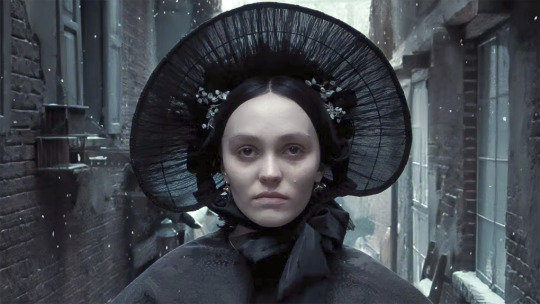
Both were severely medicalized, demonized, and restricted; and as such, when these topics do make an appearance in contemporary fiction, they are often inextricable from disgust and fear.
Dedicated as always to historical accuracy, Eggers maintains the same setting-based narrative coding.
In anticipation of morality arguments vis à vis monstrosity, depiction, and modern purity culture, let me clarify: this is something that works within his chosen genre. Horror, and especially gothic horror, invites a deeper analysis in regard to morality and motivation, and in this case, Eggers' homage to the origins of that genre grounds the narrative in its time and location, as well as fleshing it out much further than a purely modern cultural lens would permit. In this context, the details of Ellen's connection with Orlok become paramount to the understanding of the film.
As bits and pieces of their background become revealed, the audience realizes that her psychic gift did not begin with him - and neither did her melancholy, or her isolation. She was born with her abilities, and throughout her childhood, she was a bit of a tomboy by her contemporary standards, running wild in the woods near her father's property; however, once she foretold her mother's death, and once she was too old to get away with eccentricities, her father became frightened of her abnormality. She was isolated, confined indoors, and that is when her melancholy had begun. Painfully lonely and aching for some form of companionship, she called out into the ether; and Orlok responded.
Over the course of their story, he becomes the physical manifestation of everything Ellen perceives as dark and sinful about herself.
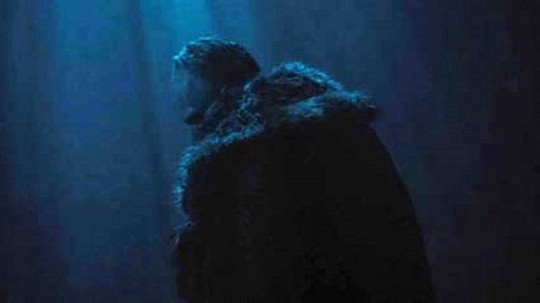
He is psychic, he is vicious, possessive, and blatantly sexual; her sensual affection with Anna parallels the evident and physical attraction he displays towards Thomas; and the social power he so easily commands is the same that she lacks, being a woman in a rigidly patriarchal society.
In the end, the severely questionable age gap, the murders, the coercion, the betrayal - all of that comes down to respect. Throughout the film, that is the one thing that Ellen is consistently denied. She is young when she meets Orlok, yes; but she is aggressively infantilized by her surrounding society even when she is a grown, adult, married woman.
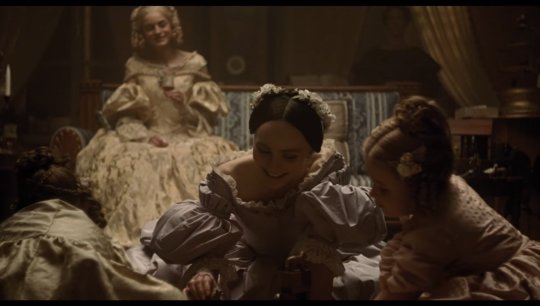
It starts from the beginning of the film, when the Hutters visit the Harding family. During those scenes, the men are shown talking business - while the women play with children in the parlour; and the same social framing persists into the body of the film. When Ellen is suffering from what appears to be some form of mental illness, she is referred to as a child by multiple different characters; and when the condition progresses, she is swiftly diagnosed with hysteria and drugged - thus being forcibly removed from the discussion of her own illness. The general reactions to that illness - which is, in fact, a display of her psychic abilities - range from annoyance to fear to curiosity; it is seen either as a disability or a curse, rather than anything entirely innate to who she is. Her fears are dismissed. Harding tells her to learn some deference. Even closer to the finale, when Von Franz admits that she could have been a great priestess in another age, he does so with pity rather than anything else; in their industrial era, he cannot help but see her only as a tragic sacrifice - horrible, but necessary to save the city from a plague. Brought in to heal her, he instead guides her to her death.
All these aspects of Ellen's circumstances find a direct opposite in her relationship with Orlok. Unlike all other characters in the film, he only ever sees her as his equal, which is made even more evident when his interactions with Thomas and Herr Knock are brought into consideration. With both men, Orlok insists on being addressed by his lordly title, "as his blood demands it"; and yet, Ellen never calls him by any title at all, be it "My Lord" or even a simple "Herr." She argues with him freely, and there is a familiarity between them that he is demonstrated to never tolerate from anyone else. Similarly, while he disguises the covenant he makes with Thomas, the terms of his covenant with Ellen are laid out clearly, in full. He does not hide from her; she already knows the worst of him, the same way he knows that she is intelligent, that she is powerful, and that she is not meant to be demure and deferring. Again and again, Orlok insists that Ellen is not meant for humanity - and the true horror, the horror she cannot bring herself to face, is that he is right.
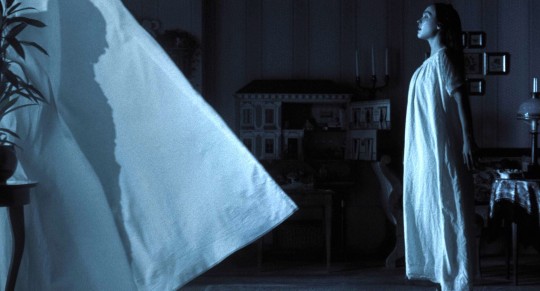
In a sense, he is a mirror held up in front of her own face. Ellen is painfully aware that she does not fit in, and that she never has. The "normal" society, epitomized by the Hardings (wealthy husband, pretty blonde wife, 2.5 kids), has no place for her - and actively dislikes her.
The film makes this ostracism impossible for the viewer to ignore. As the story progresses, it becomes evident that the other human characters - even those that do sincerely care for Ellen - never truly know her. Anna loves her, but wishes she would not talk of dreadful things - and lashes out as a result of that discomfort, scolding her. Sievers finds himself bewildered by her; Knock sees her as an object to trade; Von Franz pities her, Harding hates her, and Thomas cannot truly satisfy her, even after being touched by the supernatural himself.
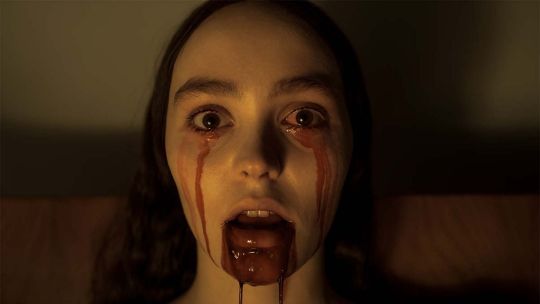
Seeing a flash of a monstrous face while they are together, he flings her away. To him, his experience with Orlok is merely traumatic, and he wishes for nothing more than to leave it behind. However, to her, it is something she cannot help but crave; and she continues to wear her lilac perfume.*
All that to say - Count Orlok is, simultaneously, everything Ellen wants and everything she is terrified of being.
That specific dichotomy reaches its climax during their mutual finale. As it is to be expected from a vampire wedding night, they rejoin in a sequence of sex, blood, and renewed vows - and what is particularly notable is that (unlike Murnau) Eggers makes it clear that this Orlok never intended to kill his Ellen, despite his inability to resist her blood. Though he drinks from her through the night, he stops at cock-crow; and she guides his head back down herself, distracting him long enough for the sun to rise. It is a duet of accident and intention. He drains her; and she holds him as the sun drains him. They cling together as they end - on a bed that serves their wedding and their death.
It is romantic. it is unquestionably romantic. However, that does not mean that the horror isn't also present; Ellen's consent, under these circumstances, is highly debatable, and Orlok is cruel, amoral, and murderously possessive. At the same time, the characters are also acting out folkloric archetypes, with precious little adjustment to that framework - which further removes them from a modern understanding of morality. He is Death, a Koschei the Deathless, a monster; she is the Maiden, a Vasilisa, a damsel. I hesitate to liken them to the Beauty and the Beast, largely because in the original premise of that story, the Beauty falls in love with the kindness that the Beast consistently displays; and it is essential to stress that Orlok has none. He does care for Ellen, in his own way, but he admits to being incapable of love as she defines it in human terms;** and, curiously, that seems to be her primary concern when it comes to the idea of accepting his proposal - rather than all the blood and carnage.
What I'm trying to say, I suppose, is that there are multiple ways of following a story, and multiple different stories in a film as nuanced as Nosferatu. Yes, it is about grooming and trauma. Yes, it is about finding love outside of the cage that is "polite society." I'm sure that it is many other things besides, with as many meanings as there are people in the theatres; after all, I am only one person, and the film grossed something over $40M in its first three days. The point is, really, that this is a story in which a rotting vampire is woken from centuries of deathlike slumber by a lonely voice asking him to be her friend; and whatever these two strange and aching souls do with that can go down any myriad of paths. The film trusts the viewer to interpret the narrative they choose.
* LILAC PERFUME - in fact, it is such a consistent favourite of Ellen's that Orlok smells it on her hair in the locket she sends with Thomas to the castle. Thomas never really learns the reason she likes that scent - even though he knows that preference well enough that he gifts her lilacs in the beginning of the film.
** ORLOK'S OBSESSION - this is a side note, but: the vampire wedding sequence reminds me strongly of the third season of NBC's Hannibal. I suppose that was to be expected, considering that Hannibal is also a Dracula offshoot, much like Orlok himself. When Ellen snaps at Orlok that he cannot love, he responds that "no; but only with you, I can be truly sated." Similarly - "Is Hannibal in love with me?" asks Will; and Bedelia responds - "Could he feel a daily stab of hunger for you, and find nourishment at the very sight of you?" I'd say if you liked that series, you should try and see the film. It works with a familiar blend of aesthetic horror.
#nosferatu#nosferatu 2024#robert eggers#lily rose depp#bill skarsgård#nicholas hoult#nosferatu spoilers#nosferatu analysis#nosferatu movie#willem dafoe#nosferatu meta#gothic horror#horror#horror film analysis#this movie respects its audience's intelligence#and that is everything to me#it doesn't spoon-feed you. it doesn't cave to over-explanation#it allows you to do the analysis yourself and read into the details#everyone say thank you robert eggers
1K notes
·
View notes
Text
Alright, so. Now that we have official confirmation for how Awakened Hollyberry looks (she's gorgeous btw, slay queen), I'd love to take the time to talk about certain design motifs I've noticed in every Ancient - namely, that they all seem to incorporate aspects of their Beast counterpart into their appearances upon awakening.
Let's look at Dark Cacao first.


Obviously, he has an awful lot more white in his design now. "The balance of black and white is key," he says. And he demonstrates that with his hair as well as his attire: a pleasing mixture of black and white, perfectly split down his middle, in such a way that they mirror each other exactly.
Next, Golden Cheese.


It can be said that the reddish tones were added more to her surroundings than to she herself (fucking LOOK AT THAT BACKGROUND); however, it remains clear that the most important part is her Soul Jam. Upon awakening, it becomes a striking mix of gold/yellow AND red, both of which seemingly melting into each other. There are also red accents in her crown/headdress now, making it look like that red hue/glow that's in her Soul Jam is spilling outwards. (Not to mention the red triangle on her spear.)
Third is Pure Vanilla.


Smaller detail is how his brooch now more closely resembles Shadow Milk's, with those teensy little dual prongs (or whatever they're called) on the sides. Bigger detail is how the underside of his cape/cloak is not only a dark blue, which was previously nowhere to be seen on his person (but everywhere on Shadow Milk's), but there are eyes in it. Exactly like the eyes in Shadow Milk's hair.
And finally, Hollyberry.


Holly has adopted an even more unique and interesting change than the other 3 have: her Soul Jam has outright changed shape, now more closely matching the angular shape of Eternal Sugar's Soul Jam. Furthermore, there are wing shapes/designs not only in her helmet, but on the back of her shield, as well. (It can also be argued that the golden holly leaves on her helmet resemble a halo. Who else has a halo?)
Why do these details matter? What do they tell us? In my opinion, they demonstrate a specific aspect of the Ancients' enlightenment: their understanding and acceptance of their Beast counterparts and their vices. In being briefly touched by apathy, Dark Cacao remembered who and what it is he must be fighting for; it is thanks to it, and to Mystic Flour by extension, that he overcame his flaws and awakened. Through her battle with Burning Spice and the suffering he inflicted upon her, Golden Cheese came to see the merit in destruction, in that it is what she wanted and needed to carry out in order to defeat him and save everyone; destruction as a form of justice and protection, not aimless cruelty. In his time in the Spire of All Knowledge, plus his brief but willing descent into corruption and despair, Pure Vanilla came to truly grasp the meaning behind both his own actions and Shadow Milk's; embracing deceit in the pursuit of truth. And it will likely be that Hollyberry realizes the folly in her chronic desire to run away from and ignore her problems while trapped in Eternal Sugar's jewelry box, and remember who she raises her shield for and why, thus regaining her true passion while wallowing in sloth.
Resolution cannot exist without Apathy, Abundance cannot exist without Destruction, Truth cannot exist without Deceit, and Passion cannot exist without Sloth. While they may not explicitly state this understanding through words (minus Pure Vanilla), it is nevertheless conveyed through these other details. Dark Cacao, too, once knew apathy through his own bitter withdrawal from the world; he just retreated behind walls and not into a cocoon. Golden Cheese was also a victim of the cycle of change, and had everything she worked for ruined; instead of bitterly forsaking all life and letting everything go in acceptance of brtual nihilism, she just chose the opposite extreme of clinging too hard to what remained of who and what she loved and refused to let go, to the point of severe delusion. Pure Vanilla also knew the pain truth and knowledge often bring - most notably in learning what truly became of White Lily - and recognizes the desire to obscure these things in favor of amusing, comforting lies. The Ancients understand their other halves completely, their hatred and pain and sorrow, and the virtues turned vices they now stand for. And thus, they quietly embrace the power and importance of these skewed ideals, for it is they, and those fallen heroes that champion them, that finally made the Ancients become who they needed to be. They finally became whole.
In essence, they say, "you are a part of me, now and forever, for better or worse. And I accept that. I accept you."
I've been wanting to make this analysis post for a while lol. Thank you all for coming to my TED Talk, I look forward to when and how White Lily incorporates Silent Salt into her design
#i also have additional evidence via Ancient lobby designs that I believe further prove my point#but you can only upload 10 images in a post on the Tumblr app lol#if anyone would like. I'll reblog the OG post with the lobbies and explain them#(but if you remember what they look like... I'm not sure they need explanation lmao)#also this isn't necessarily a Beast x Ancient post but you're welcome to view and/or tag it as such if you want#cookie run kingdom#golden cheese cookie#dark cacao cookie#pure vanilla cookie#hollyberry cookie#ancient cookies#beast cookies#crk update#crk analysis
390 notes
·
View notes
Text
Falin who cares too much and too little - analysis
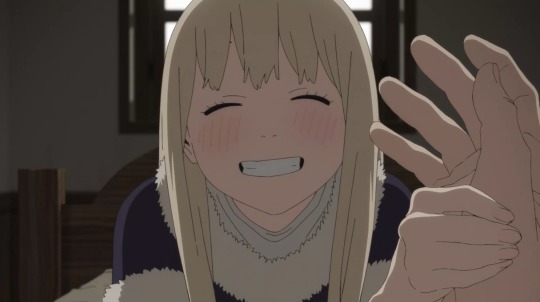
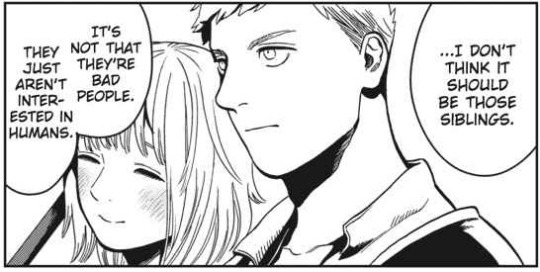
Been stewing on Falin thoughts for a while, I know I have an interpetation on her that differs from many but I’m jumping into the fray. I think there’s a lot to be said about what we do see of Falin. This shorter Falin analysis I made is heavily encouraged prior reading. This analysis mainly explores her complex relationship with caring and so it’s sort of structured in two halves, with Faligon at the crux of it all.
Falin cares too little :
A lot of people assign Falin a people pleasing mindset and I… Don’t agree. We never see her care at all about people in her town or at the academy not liking her.
We do see her worrying about what people think of her… ONCE. And Laios comforted her, told her they didn’t matter and she should be proud of herself. She latched onto that hard. That’s why this scene was so important to be included during the dragon fight, relationship-defining; it’s always been them against the world. She grew to not care what others thought, to only focus on her close loved ones. No one else matters.
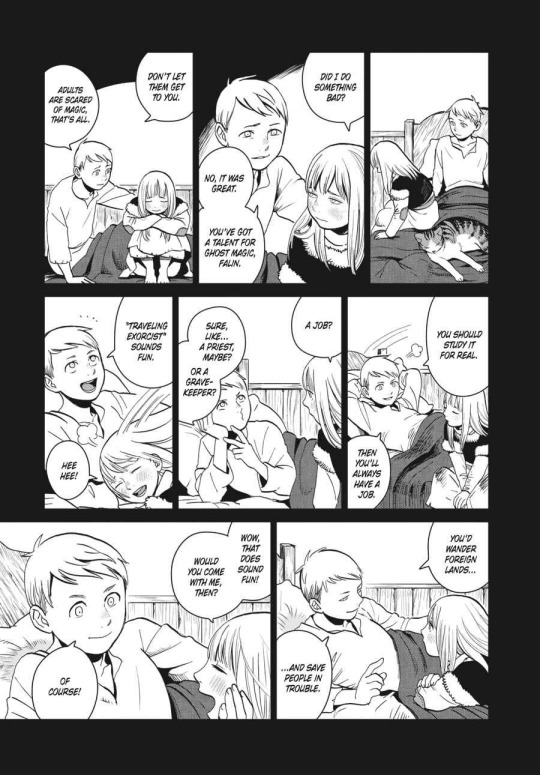
Laios’ words were her world. Her older brother who taught her how to feel comfortable with herself, who told her, you’re great, others are the ones in the wrong to not see that, I’ll always be with you, always be there for you. Older brother who always made great plans, who always knew more, who was better at wrestling to name the dogs, who she has always idolized. Laios who always spoke of traveling the world, to which she always said she wanted to follow. And she would, she’d follow him even if it meant leaving the academy and all she knew behind, she’d follow him to the ends of the world, and that’s what she did.
She didn’t care about showing to her classes or keeping up such appearances, she doesn’t even think of toning down her jumping into bushes when Marcille recoils, etc. She acts like an obedient pawn often, to her parent’s directives and then following Laios around no matter what he decides to do, but I don’t think the motivation is people pleasing, rather it’s being with & caring for her loved ones, and her go-with-the-flow attitude enhances the impression. Not that it’s as simple as that, mind you, but let’s talk about this for now.
Falin is perceived as selfless because we, the audience, have our perspectives revolving around the main people in her life (Laios, Marcille). They’re the ones she’s devoted to and people who care about her back a lot too, but to people like her classmates or the towspeople she probably must have seemed like someone who didn’t care about the people around her or her surroundings a lot, who just went on alone and did her own thing.
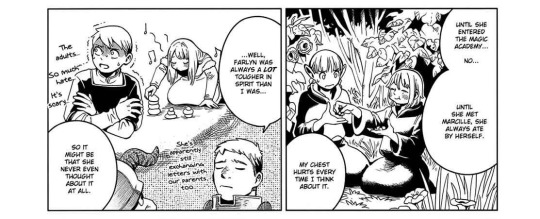
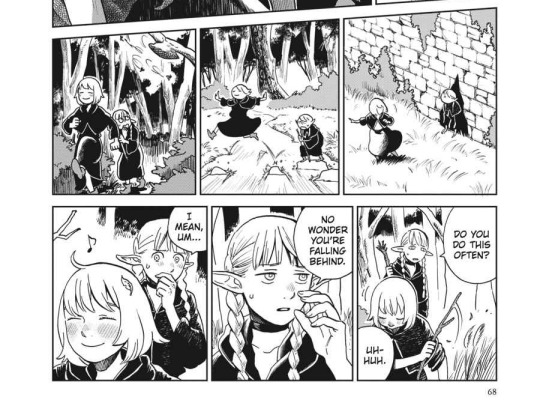
What matters to Falin? From what place does her kindness come from? Is a part of her keeping up appearances? And I think that’s the point, the horror of Faligon as well, that we can’t tell just how in control Falin the person is as the chimera (because we are shown that she’s in there, we just don’t know at what degree), that we don’t know her enough to be able to tell when she’s at her most genuine, her most raw. That even if you do settle on none of her being present as Faligon, we have to at least consider it, consider that she may be able to do something like this and have a part in it, brutal and uncaring. That even the lenses we see her through, the people who love her, may be unreliable.
And this is what’s very interesting about her too, she truly is so idealized by people around her as a saint. She’s so good and kind and caring to everyone etc etc etc. Laios, Toshiro and Marcille all see her as the paragon of goodness in the world. More cynical characters like Namari and Chilchuck have more layered opinions on her, the latter finding her somewhat unnerving because he can’t read her well. But then with that one flashback scene we see that… Her priorities are intensely focused on Laios and Marcille, she doesn’t care all that deeply about anyone other than them (+ maybe her parents). The rest of the party is in the same danger here but only Laios and Marcille who she’s speaking to get the special ,ention, and if they don’t cross her mind then of course she’d be ready to sacrifice strangers through a risky teleportation. That doesn’t make her not kind or caring!! Just that greater good isn’t exactly her priority. Any means is alright if the end result is her loved ones safe, it usually takes the form of healing and caring, but we see she’s ready to fight and make dangerous calls too. To me there’s this aspect to her that she isn’t as pure and magnanimous as everyone thinks she is, both in-world and interestingly enough meta wise as well, and there’s something interesting to that.
People pleasing implies a need to be liked, needs for the motivation to be that. A yes-man, etc. But if we analyze Falin, her general kind, smiling demeanor is more a matter of passivity I yhonk. Conflict avoidance is easier, so she’s friendly and hopefully things’ll be smooth sailing. It’s easy to be kind to classmates even if they act wary and rude if you don’t care about what they think either way. Of course she prefers good things happening to people over bad things, she is genuinely kind, but I think people tend to assign her a very grand altruistic way of life when to her the motivation is pretty self-centered. She doesn’t do what she does because she loves them, but because she loves them.
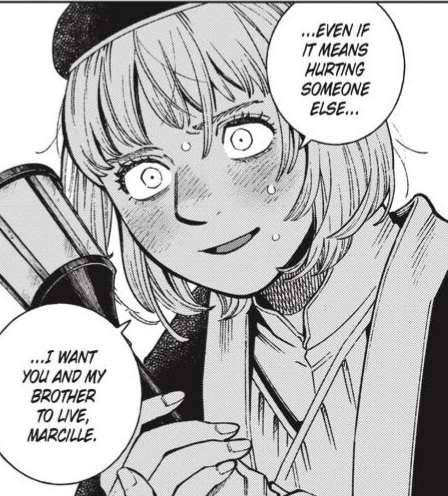
One situation that’s interesting to dig into for her way of thinking, and what I’m trying to get at, is Shuro’s proposal to her. I’ve seen people saying she hesitated because she didn’t feel comfortable saying no even though she wanted to, "I can’t say no, I don’t want to hurt him", something that sounds sensible and familiar, but it’s actually canon in the Adventurer’s Bible that the reverse was the case, that she didn’t feel comfortable saying yes. Because the offer was tempting, but it’d have been a loveless agreement on her end. And it makes sense she’d want to say yes too, like we see with the Toudens, marriage is very much a political strategical economical thing in their village, there’s even a bit on it on Laios’ Adventurer’s Bible profile about dowries, and both siblings were engaged very early. They lived poorly for a long time, it’s an enticing idea to marry rich, to have not only yours but your brother’s needs met forevermore easily, which at one point in their careers was their main worry and goal. Why shouldn’t she accept a life of leisure and wealth handed to her by a lovely friend?
So her hesitance was "yeah that’s convenient for me, but where it’s everything to him and heartfelt I’m able to be detached because I don’t care about it that much… Can I do that? I’m not reciprocating, not saying yes in the way that matters. Can I do that to him?" Very caring even though it’s not what you’d expect, isn’t it?
And central to my analysis, where I’m going with this is, I feel like that’s the thing with her character, that she doesn’t feel as strongly as she "should" sometimes, or feels a different way than she "should", or at least that she feels that way and others say she does. She didn’t mind suddenly leaving the academy, leaving Marcille behind and not seeing her for 4 years. She acted like it was no big deal that she sacrificed herself after getting resurrected after the red dragon fight. And in both those cases it upset the people around her greatly that she didn’t seem to get why it was such a big deal, didn’t seem to care about how they’d experienced her choices.
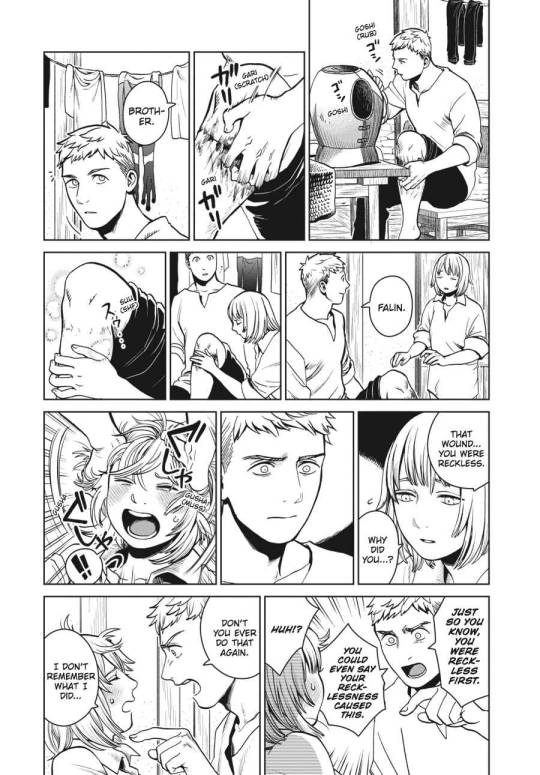
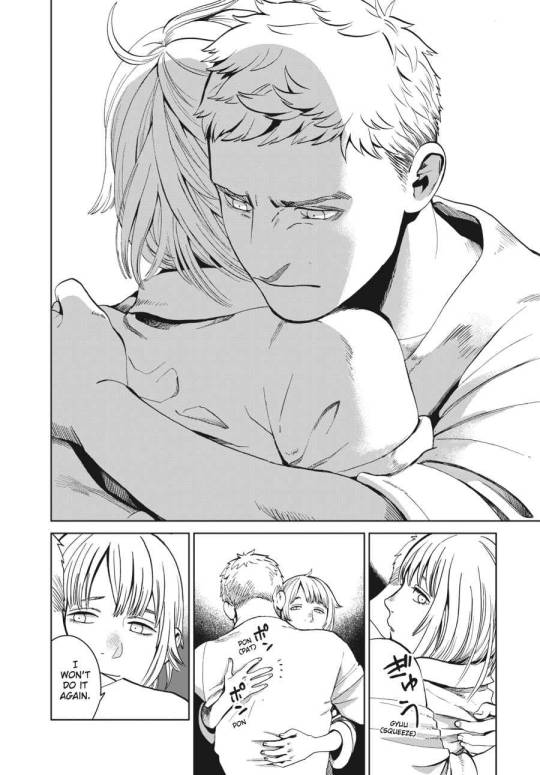
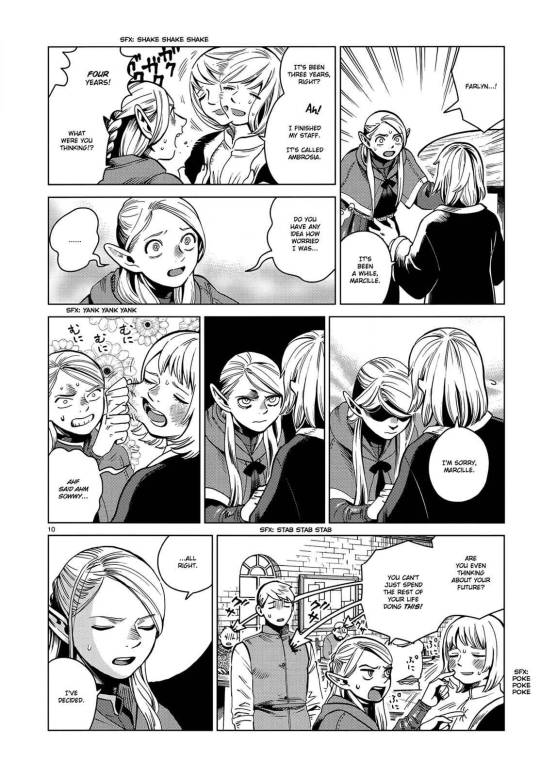
So it’s a tendency… And it’s not that she doesn’t care, it’s just that the way she measures what’s good for the ones she loves isn’t the same as what they themselves think it is (like Laios and Marcille not wanting to be apart from her). It’s an overt but quiet kind of care, it’s doing things like following them around and making sure they bathe and have a meal, even if that means she has to be dragged into misery too.
So yes she probably would know "not caring enough/the right way" is one of her perceived flaws, and that informs how she tries to handle her response to Shuro’s proposal. Her not wanting to accept like her first gut instinct, is because she’s thinking about reciprocity, about if it’d be right to go into this knowing that they have different priorities and she might not be able to keep up with the type and amount of emotions he wants/expects from her. And that’s a big part of her character isn’t it, having expectations pushed onto her. Her trying her best, but in her own way that may seem odd or even unfeeling. Not unlike when she exorcised the ghost as a kid too, unblinking and matter-of-factly, and not seeming to understand why people stared the way they did.
Even though she answered his proposal only post-canon, she’d been pondering it for a while even pre-canon and the Adventurer’s Bible explanation was released midstory, so I’m hesitant to assign her much growth about her hesitation and what I went on above, since she still didn’t react "right" with Laios after the red dragon fight (even if she apparently doesn’t remember sacrificing herself) and put herself in that situation in the first place. She hasn’t finished her arc on that flaw of hers is what I’m saying, she for sure still has it, but I certainly think her thoughts on Shuro’s proposal shows awareness, both of herself and social.
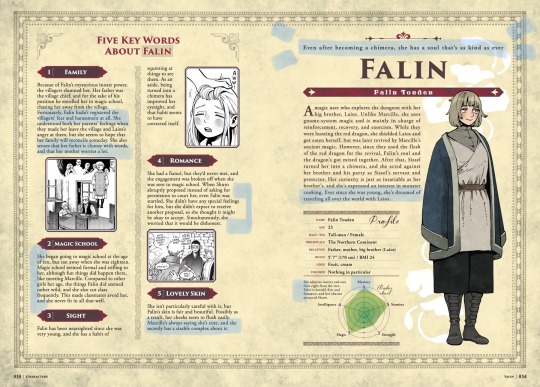
And awareness is a big analysis key word with Falin, especially here it can be hard not to conflate not caring with not knowing. How socially aware is she? It’s rather layered, because canonically she wasn’t aware of her ostracization in her hometown at all, and we’re not sure if she knew Shuro was interested in her before he proposed, but she generally seems more socially aware than Laios. She tags along on his caravan job to make sure he isn’t being mistreated (though doesn’t ask he get a salary), she catches social faux-pas more easily like in the genderbend magic mirror omake with Shuro, and interestingly enough she’s very good at empathizing with her parents and understanding their perspective. We see when she’s worried about Marcille coming that she does know about propriety and how appearances shape impressions. Being a chief’s daughter must at least have taught her a thing or two on that front.
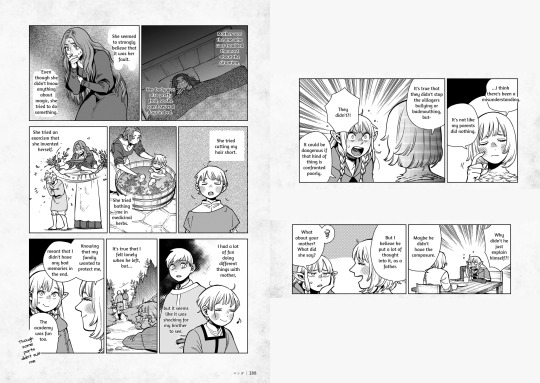
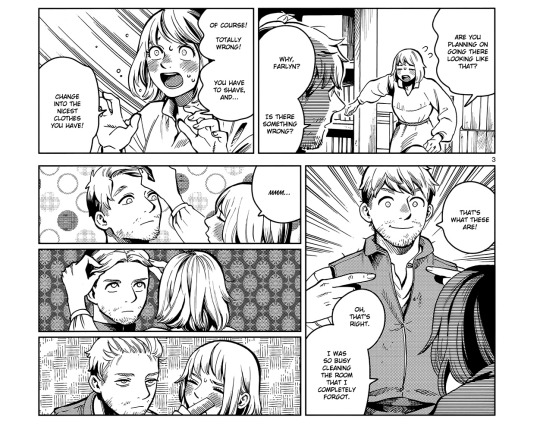
She never stands up for herself, but when it comes to defending others she worries, strategizes and explains.
And this sort of understanding is part of why I think she’d notice the expectations pushed onto her like I was saying earlier, notice how she makes people feel when she’s careless. But if she changes anything about herself in response to noticing is for her to choose, and generally I think it’s a sort of inbetween of yes and no: that she becomes more complacent but also more reserved, complying but by hiding more of herself passively. She’s not sure wether to accept or reject Shuro’s proposal, doesn’t want to lead him on? She’ll just be taking a while to silently consider it, try to keep things as they are for the time being. The third, less conflicting option. She doesn’t feel heard by Marcille who keeps infantilizing her? Just bear with it. Retract yourself emotionally. Settle for it.
We see that when she was young she had a tendency to not read a room, and I think that’s here too. She doesn’t get why her nonchalance upset others but that doesn’t change that she doesn’t want them upset or hurt, so she tries, albeit in maybe a roundabout way. She always had a hard time deeply connecting with people, often keeping herself some amount of emotionally distant: erasing herself from the equation, from the two-way trade that relationships are and making it a onesided thing instead, where all their needs and emotions are directed towards her but she only lets out a bit of her own show. She takes everything upon her and deals with it and tries not to give others this same burden, though not on a conscious level, it’s just that she’s learned growing up that she doesn’t have much agency.
Like I went into with my analysis linked at the beginning, I think Falin is used to just taking what she can get and not asking for more, when it comes to social bonds. She’ll take spending time with her mother no matter what it is they do, she’ll follow Laios to the graveyards and stick by him even when he’s pushing her away (because he doesn’t want her borrowing his book or "No copying!" or such). Her father was always distant, cold and uncommunicative, her mother was considered sick from anxiety and the exorcism attempts were the main way they spent time together, at dinner tables there were only her and Laios. The dogs picked on her too even if she loved them— And so did the townspeople, maybe that being normal to her at home is why she didn’t notice the ostracization she suffered.
She’s always been the last to be asked about decisions or what she wants, never asked to play with at recess, neither her father or Laios asked before sending her to the academy or leaving the village. At home, in the hierarchy she was considered to be below the dogs by the dogs themselves, as someone they can disrespect. Dogs learn from example and behavior, so this means Falin must have been pushed around a lot, and that the family didn’t try hard to rectify the dogs’ misconception, likely worsened by Laios regularly wrestling with her as a competition.
So for example when Falin showed Marcille food, it was her way to implicitly ask to have lunch with her without voicing that question, without daring to take up space. Someone’s presence isn’t something you ask for, it’s something that’s bestowed upon you, you can follow them around but you can’t ask them to stay or to come with.
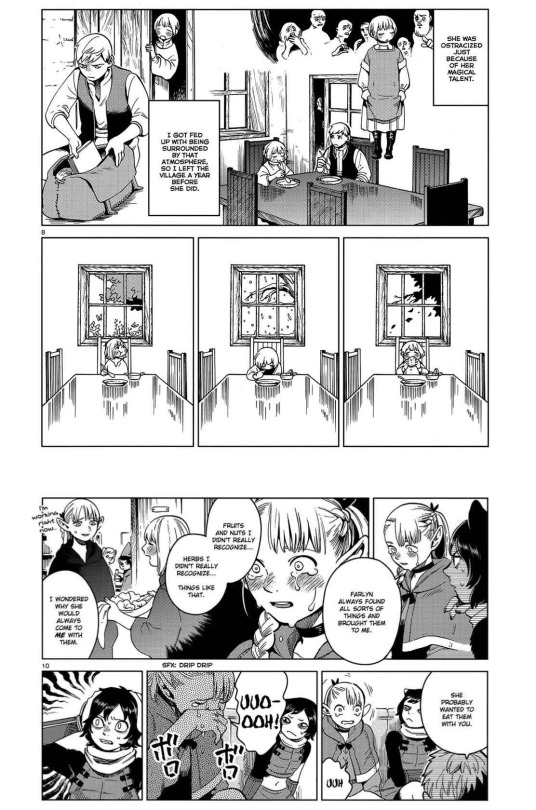
She’s used to her needs and wants not being listened to, so she’s learned to have less wants. Caring less about herself, caring less about other people beyond her safe zone, was a defense mechanism in part. She has a sense of learned helplessness too, like how when Marcille came to take her away from Laios, even though she didn’t want to leave with Marcille it felt so determined and unshakable to her that whatever Marcille decided Falin would have to comply with.
And still, it’s the "marrying you would be awfully convenient if it wasn’t that I’d feel guilty for not loving you back, the way you wanted me to when you proposed to me" and the "I don’t regret leaving the academy and leaving you behind without goodbyes but I’m sorry that you’re so much more upset about it than me". It’s the guilt of not loving people back the way they want to be, with the same intensity or fervor.
It’s the autism it’s the aroace of it all, it’s the emotional stunting and confusion but the pit in your stomach telling you you did something wrong again. The no object permanence even for people you love even for 4 years, it’s the feeling like you’re somehow at fault for someone having fallen for you and not knowing what to do with any of it. I’m not joking btw it isn’t uncommon for autistic people to not see their close friends for a long while, not having missed them all that much and for that to be really hurtful for the other if they notice/ask about it. "Hiii bestie! Oh umm you’re uh more emotional about this than I expected, hopefully you won’t feel alienated by me not feeling as intensely about it…"
So… Yeah. I think she thinks of things and relationships in a different way than most people, and beyond "good things happening to people is good" I don’t think she actually cares about people all that much. I’d argue that Laios shows more desire to connect with others and make relationships. And just like with Laios and his own issues with humans, that doesn’t mean her kindness is a lie or ungenuine or worthless! It just means that like, well it’s pretty straightforward really, she’s not all that social and doesn’t see casual bonds as meaning all that much and whatnot. She does want to see people happy, but it’s not as much like… A conviction or goal. She’s too laser focused on a select few people. "It’s not that they’re bad people, they just aren’t interested in humans."
And sometimes it feels like people get defensive about Falin in a meta way too, like if you ever so much as imply Marcille isn’t her whole world or that she isn’t the kindest soul out there then you’re saying she doesn’t care at all or she’s evil. And that’s actualy exactly the sort of vibe I wanted to get through with my analysis above here actually haha, that she does care and she is kind but it’s not in a way that’s quantified or understood in a way that makes people feel comfortable. In a way, that makes people feel insecure because they don’t have the same logic as her, don’t show love the same. And I think this is another stellar depiction of autism, of parts of it that feels unpalatable to many, if I’m making sense. The fandom idealizes her as well, which isn’t uncommon or surprising for the character embodying the trope of the perfect beloved to rescue.
And disclaimer, as I said in the tags I feel like the details of Falin are pretty vibe based when it comes to analysis, there’s absolutely a valid angle where she does super care about everyone always, feel free to disagree with me on the overarching angle of my analysis. There’s enough supporting evidence to tip the balance either way I think, and the reason I’ve chosen this angle is I feel it’s more compelling for the themes in Dunmeshi of idealization and being different, of desires vs wants, and because I think it neatly ties up Falin’s character arc as I’ll go over throughout the next section…
So.
Not feeling as much as she should. And……. Is this not Faligon pushed to the max?
You can’t tie down a dragon. As the chimera, she gets to just not care about everyone else and be on her merry way.
Part of it I think is finding comfort and freedom in the mindlessness, in not having the burden of feelings and connections and a consciousness (despite still ending up seeking those in a stranger, Thistle). Like when she’s dead in the purgatory as well, she gets to just… Hang around and do whatever. Similarly to when she played in the forest instead of going to class in her academy days. That’s what freedom and peace of mind looks like to her. Why she decides to roam post-canon, if only now with the goal to find herself instead, with her mind in tow and somewhere to go back home to.
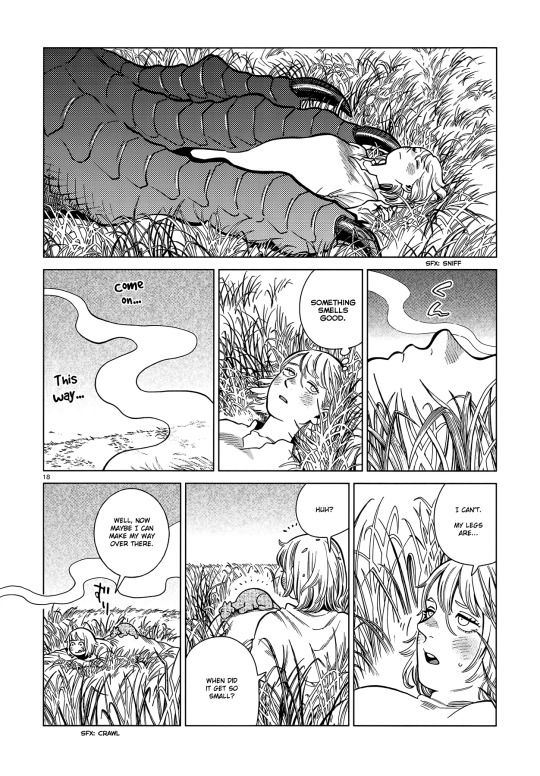
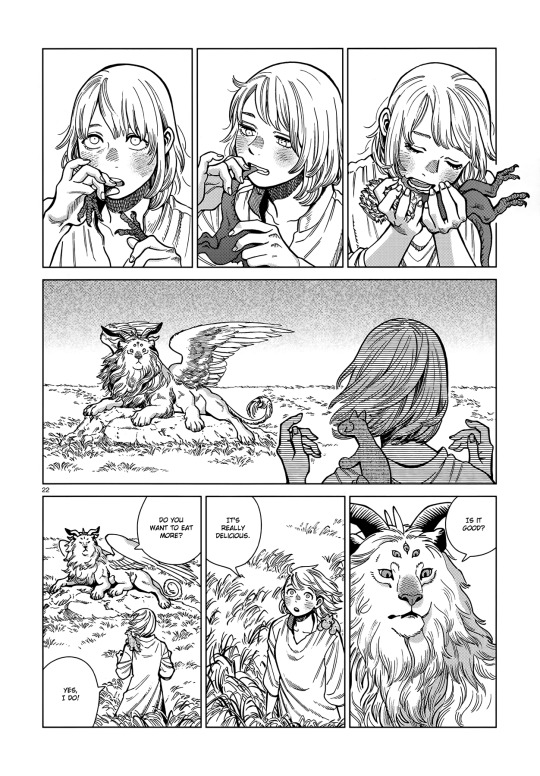
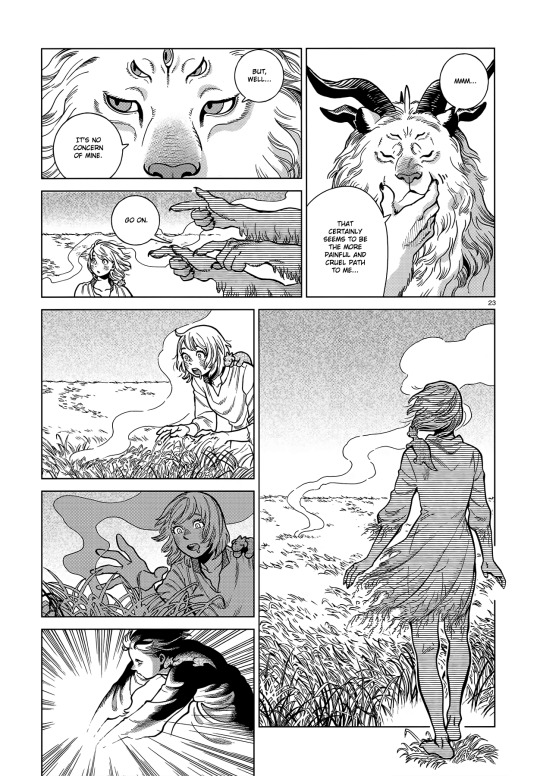
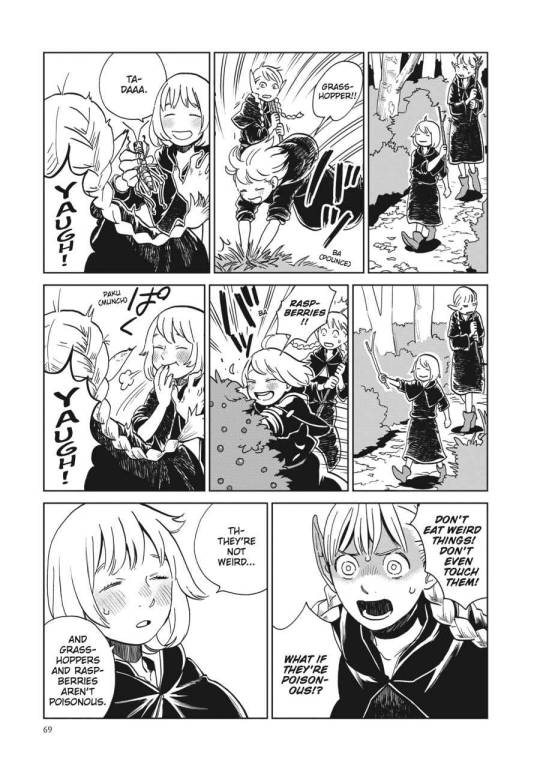
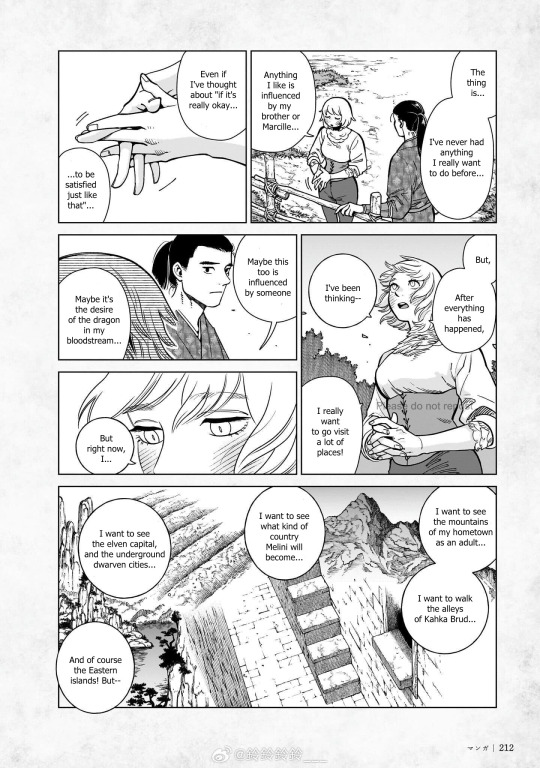
There’s excellent analytic framing out there about how of course, Dungeon Meshi has a big theme of grief and letting go, and… Falin was always a symbol narratively, idealized by characters and often underconsidered by them despite their love. It was Falin’s choice to sacrifice herself for Laios, she thought it was worth it, knowing that it would be her end. Her resurrection and the process of it intertwining her soul with a dragon’s wasn’t done with her consent, and the subsequent opening it gave her to become a chimera puppet. She’s stripped of her agency consistently, and so… It’s very noteworthy that the final choice, of wether to go back to life or to stay dead, in that purgatory scene, was up to her. And she chooses life, but I do think about her in those fields and how at home she seemed there. Peaceful, by herself in a vast calm expanse she could explore, free.
Personally, I think freedom is Falin’s own subconscious selfish desire. And though to us becoming the chimera is obviously a shackle, I think it felt like freedom to her somewhat, too.
And if you think I’m going wildly off the rails here I want to talk about Laios’ wish of becoming a monster. And to be clear before getting into it, being mentally a monster is absolutely a big part of the appeal for Laios, it’s something that’s consistently referred to, something especially pointed out in the werewolf monster tidbit with Lycion. Right panel is from that, but left panel is from the extra with Izutsumi where Lycion talks about suppressing souls in a beastkin body, the human or the beast soul.
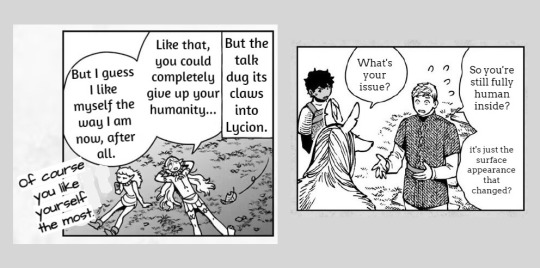
Finding comfort and freedom in being mindless, less sentient, less aware? While being unaware in her hometown might have saved Falin a lot of heartache although perhaps stunted her emotional growth, it’s always been Laios’ curse.
Actively, through his choices, he seeks to grow closer to people, to form deeper bonds, to understand and be undertood, but… On a deep seated level, what he desires is to leave humanity and civilization behind. He has an irrational hatred for humans, born from the trauma of ostracization, being different, being beaten up and rejected consistently through his life. Running away from problems is easier. He wants to be free from being a social animal from a social species who has deemed him the black sheep, he thinks it’d be simpler to just leave it all behind, people and his own humanity. At its core, to Laios becoming a monster is a power fantasy, a coping daydream of "if only I could be strong enough to never be hurt again, the power to destroy anything I want, the power to go somewhere better, if only it was possible for me to never feel hurt again. If only I could be someone, something, that can never be hurt". "If there’s someone you don’t like, you can gobble ‘em up in one bite. If you could fly, you’d be able to leave this village right now." It’s a childhood fantasy, from a deep sense of being misplaced and a desire to be able to stand fearless, thinly covering up resentment that Laios represses.
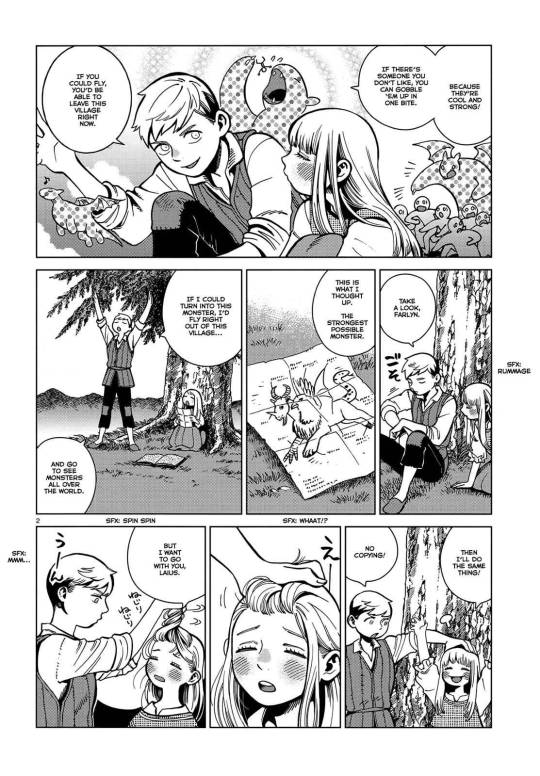
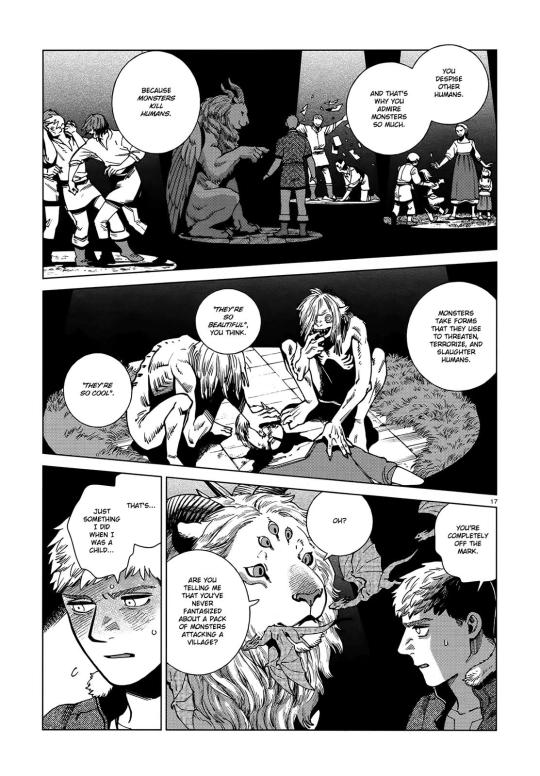
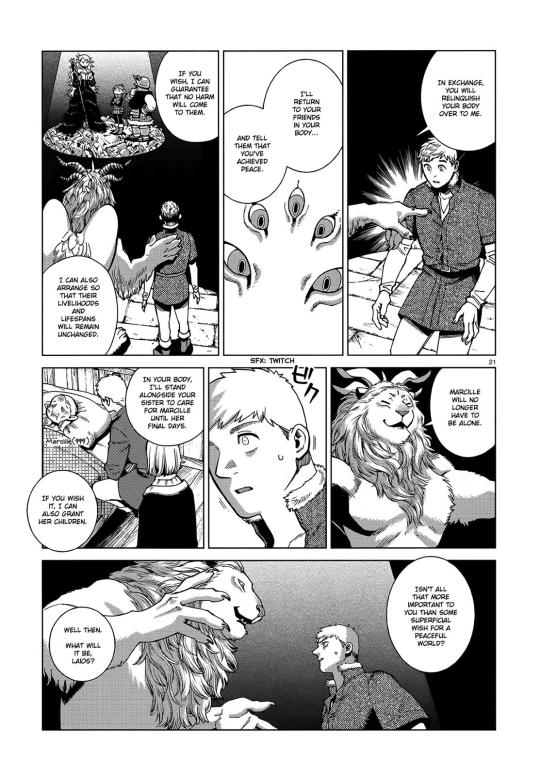
But you’ll notice, when the Winged Lion is enticing him in the last page, even now with his lifelong wish of becoming a monster on a silver plate, he still cares about his friends. He still has that sense of responsibility to his friends, doesn’t want to leave knowing they’ll be in danger and alone. The offer that his friends may be left unharmed is already good, but Laios also visibly flinches when the Winged Lion offers to specifically care after Marcille and rid her of her biggest fear. Laios’ care runs that deep. Not unlike with the succubus, he resists temptation until he gets reassured that everyone will be okay. But see, what he desires isn’t to stand alongside Marcille until her last days, it isn’t to stay and see how well his friends will live, it’s to go. It’s to leave. It’s to fly away, a monster both in body and mind. He wants to be free from caring here, wants to not have to worry about his friends, wants to just go do his own thing, but for that he needs to feel safe in the belief that said friends will be safe even without him being there to see it, because despite everything else he cares, he does. It’s again that dichotomy about caring and wishing you didn’t, or not caring and wishing you did.
In the end, it’s Falin who achieves that wish. Both by becoming a chimera during canon, and by going traveling post-canon. In the latter, being both free of human relationships as something chaining you while still being uplifted by them, by the knowledge that there are people out there you love and that love you. It’s a theme that can also be connected with Marcille, because she gets anxious over people she loves getting out of her sight, worrying they’ll get themselves killed, that time is passing while they’re away from her. But before she can get to the point where she can both have her freedom and being uplifted by her social bonds, regaining both her individuality and her connections, she has to get a taste of just one at a time. Before they can find balance in her life, she has to see what it’s like to have what she’s never had on its own. Unapologetic freedom, and power.
No one can blame you for not caring enough or caring right if you’re a fricking dragon!!!! You make the rules when you’re a beast and you can just… Fly away. From anywhere, from anything. And if a dog bites you you can just crush it. Instead of being pushed around by the dogs because you’re at the bottom of the hierarchy, you’re now at the top, the one with the power to be heard and do what you want without consequences.
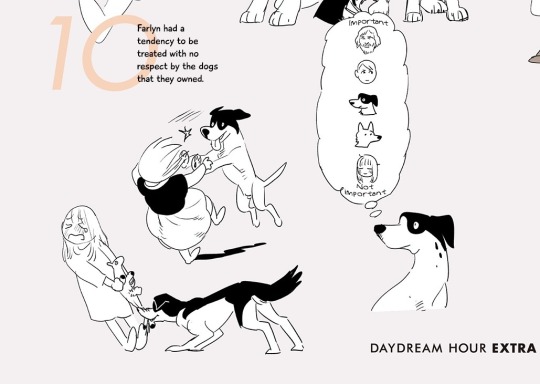
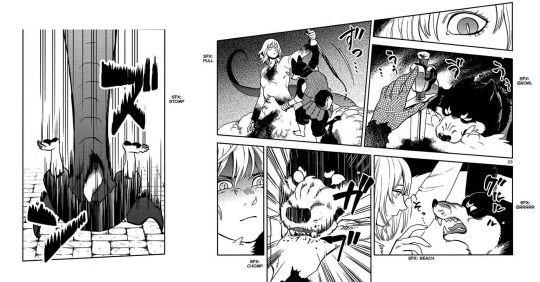
I think she’s on autopilot. I think she’s on autopilot a lot of the time, even before being a chimera, and it’s partly why her will is so weak compared to regular dragons. (Again, read my shorter analysis.) It’s familiar to slip back into the role of following someone around unquestioningly. And that’s what is weaponized when she’s a chimera, that instinct she’s been nursing all her life to unconditionally support, defend and follow someone. Only now, that someone doesn’t matter in itself, only the symbol of it. She doesn’t mind, either way is fine. Her will is weak after all, because she’s trained it to take as little place as it could.
Falin cares too much
She spends all her time caring for Laios and Marcille alternating that none of her care and emotional energy is left for others, including herself. So she had to get relieved of all of that for a bit, becoming the chimera so she could reset and recenter and remember that she, too, indeed, is there and an important part of her own life.
So you’re probably seeing the duality I’m talking about here, Falin is very self-sacrificial but for specific people in ways that they often don’t recognize or appreciate. She cares but selectively, both in people, putting all her eggs in the same baskets, and in the ways she cares after them. She doesn’t care a lot, but when she does she cares a lot. Falin doesn't have a lot of earthly attachments, but when she does, they're her world.
In canon her arc, especially post-canon, is to grow beyond Marcille and Laios. Her caring for her close loved ones held her back from looking after her own self-fulfillment needs. And this is what I mean when I say she cares too much; she could gain from caring more about the world besides Laios and Marcille, both lands wise and people wise. She cares too little, but her arc centers her flaw around caring too much instead. Her pitfalls that Kui highlight over the course of the story, while of course her selflessness is appreciated for how she saved Laios and everyone, on a personal level is shown to be self-effacing and damaging. She’s undermined by Marcille, without the courage to voice her thoughts and wants, she would dedicate her whole life to Laios. And I mean, it’s text, in the response to Shuro’s proposal extra no less. And she’s so laser focused on her most loved people that she’s fine with being callous and risking others’ lives, even.
Post-canon, she needs to leave to find herself, away from them.
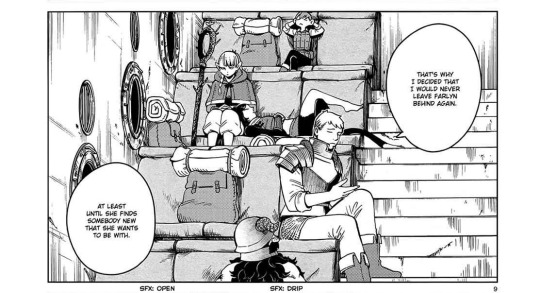
Herself. What if she wants to just be with herself for a while.
And this is me reaching but I feel like, not unlike Izutsumi who learns to feel this sense of never being alone, always having someone on your side what with having two souls, the dragon in her would make her consider herself more. She finds it easier to care after other people after all, and in the purgatory fields sequence she takes care to bring the bit of dragon left with her… Not unlike with Izutsumi, having two souls forces you to think about your identity and figure yourself out. Besides being this sort of duo now, where if she wants to care after herself she can channel it to that other side of her too… In meta dragons are symbols of greed, and I think the bit of dragon would push her to want more and listen more to her desires, primal and self-serving as they might be. The dragon soul which warped her human body with feathers and draconic features, her image of perfection marred, her weirdness externalized in a way that’s not palatable. But she doesn’t care, about if her appearance is palatable for most people, she hasn’t for a while now, and that’s great.
Notes & nuance
I’m struggling with the structure of this post, making my points organized, concise and strong at once. It’s difficult to make any statement without going "things are generally like this, but there’s this time that this contradicting thing happened too" or "it’s ambiguous enough that you should just follow my interpretation for the time of this analysis" haha, so this is the pit where I put all the stuff that wouldn’t fit well in other places but are interesting for Falin’s character. This section is pretty separate from the main thesis of the post, it’s just more Falin observations. The post has reached the 30 pics limit so I can’t just pull it up whenever it’s relevant but I really encourage scrolling up to read the stuff I highlighted in her Adventurer’s Bible profile if you haven’t already.
I think with the shy-looking loner type autistic kid archetype, and knowing she didn’t seem to mind others ostracizing her, it’s easy to lose sight of how she was by no means an unemotional child. In all the bits we see of her as a kid she’s bursting with energy and emotions. Canon confirms Laios leaving the village did affect her and make her lonely and she cried a lot, too. She may not be social in the traditional sense, but she was clingy with her brother, and she also never was all that shy about who she was, wearing her heart on her sleeve.And okay. Okay okay okay. Speaking of appearances. About what I said of her not caring about what people think of her, even seeming defiant with the caravan leader… There’s one istanxe of her caring actually, and it’s about how her face blushes easily. I remembered it as being because Laios’ said it and as I rambled Laios’ words are her world, but actually it’s ambiguous. It’s only Marcille imagining up this scenario where Laios says Falin looks weird because of it, there’s no evidence Laios said or thought that at any point. And on the other hand…
Her Adventurer’s Bible says: "5, Lovely Skin. She isn't particularly careful with it, but Falin's skin is fair and beautiful. Possibly as a result, her cheeks seem to flush easily. Marcille's always saying she's cute, and she secretly has a sizable complex about it." The phrasing makes me think the complex she has over her blushing might have developed because of Marcille more than Laios. "Marcille's always saying she's cute, and she secretly has a sizable complex about it." It could be related to how Marcille gets swept away and infantilizes her, calling her cute wanting her to wear cute feminine outfits etc. Again this feels like it relates to Falin’s struggle to be seen for who she is and what she wants to be seen as, her struggle to be recognized, having ideals and perspectives pushed onto her. Here Falin is insecure over her blushing implicitly because she doesn’t like being called cute over it, but that’s not how she wants people to see her. She doesn’t want Marcille to always see her as her 10 years old adorable friend. Like if your friend said you had puppy energy, it can be flattering, but it can also make you insecure.
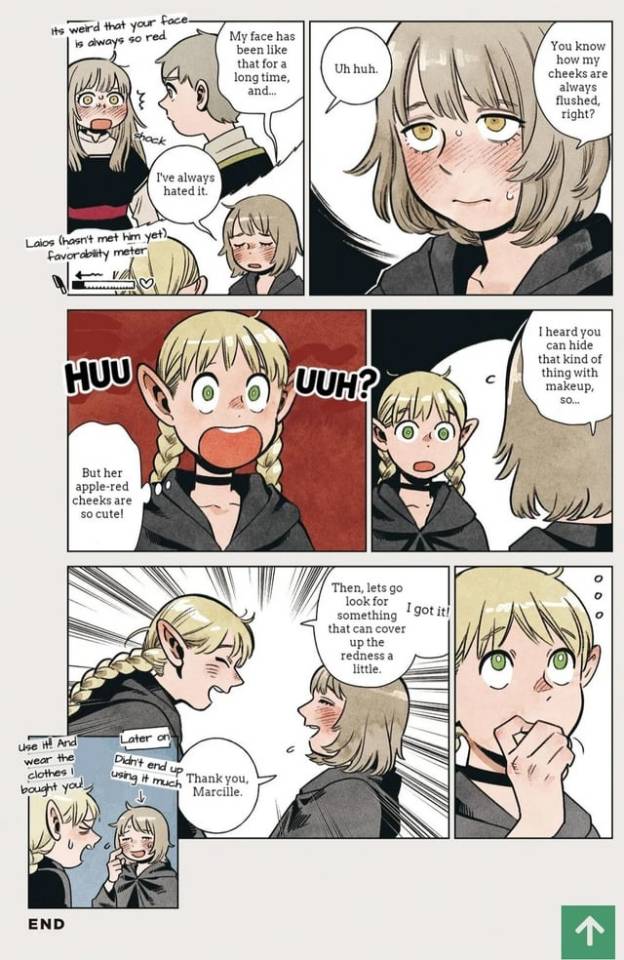
Here’s a link to what I mentioned about her being uncomfortable wearing feminine outfits. It does seem to be more about comfort than the aesthetic perse, to me. Interestingly the shirt & shorts don’t seem like they show much more skin than her beach outfit, so maybe it’s more about the shirt and shorts being tight-fitting. Like the skirts and heels they feel stifling. Again a bit with themes of freedom and not wanting an aesthetic pushed onto her. So yes just to reiterate, I think this is more about self-affirmation and how her identity and self-image gets shown to others, rather than wishing to hide parts of her body like her blushing etc for people pleasing reasons. Makeup was a way for her to appear how she wants to and feel more confident. It was a way to take control over her own image. She didn’t keep doing it, the narrator stating the process to be ‘troublesome’. Ultimately she still prioritizes her comfort, and it was a lot of recurring efforts to go through.
And on the topic of appearances… A friend once asked me: "Does she really hide herself or not? I keep thinking about "falin is herself first and foremost" (in her Adventurer’s Bible profile) it’s just so. Hmmmmmmmm... I just keep seeing people say she hides her real self from people when I feel like the issue is more about her charitable traits straying too far into becoming flaws but people around her dont realize that..."
Imo the thing is, I don’t think she hides her identity, but I do think she suppresses her individuality for others’ sakes if that makes sense. In the way that only post-canon does she allows herself to go see what the world is like, but that’s not personality wise it’s needs and wants wise. And I do feel like that’s the closest interpretation of canon, she says it herself she doesn’t know what she wants because everything she’s done was always about Laios or Marcille, but she doesn’t change her demeanor or personality for others. But she *will*, like, not ask for things she wants directly, like sharing lunches with Marcille at the academy, she suppresses her wants, doesn’t ask things from people and doesn’t hope for more, hope for better. I don’t think we ever see her actively repress her personality, except like what, being more laidback than enthusiastic but I do feel like unlike Laios with her it’s less ‘appearing stoic to fit in more’ and more ‘yeah i’ll just chill until I’m needed or something activates my enthusiasm’. To which said friend quoted: "to feel like you belong you need to be useful. when you can’t be useful the next best thing is being convenient."
And speaking of passivity… I want to speculate about Shuro’s proposal some more. Shuro and her got along well though we don’t know how much, or how often they hung out, she even saved him from a nightmare. Why did she take so long answering Shuro’s proposal? Was it an effort to preserve or was she really just that conflicted? Procrastination probably yes, but what is the core motivation of itl Considering she ended up saying no to travel the world instead, I don’t think it was as simple as ‘she wanted to say yes for convenience’. Logically it’s what would have been best, but it’s not what she wanted for herself, but it was and still is hard for her to even know what she wants. Probably, since like she states it was a great offer and she doesn’t think she’ll get proposed to again, it’s that self-effacing tendency that yes it’d be convenient and logical, and that makes her want to say yes even if her spirit isn’t in it, because if it’s convenient then that’s more important than her feelings on the matter. Man also… Obviously Marcille is very vocal about how she shouldn’t get with Shuro, but imagine how Falin’s whole perspective on marriage must have felt when her only friend ever is a Romantic with a capital R who gushes about idealized romances and grand gestures and True Love and doing things with fully pure feelings all the time.
AND speaking of passivity!!! How much Falin is "there" as the chimera, just how much she’s master of her actions, is left ambiguous and intentionally so imo, but she’s for sure there & influencing the dragon’s action to some degree. Having a dragon’s foot on her in purgatory that keeps her from moving for sure visualizes how it must have been like, but there’s Falin calling out to her brother Laios, there’s the kind attentions towards Thistle that are so Falin-like, and most explicitly there’s the Adventurer’s Bible stating "Even after becoming a chimera, she has a soul that's as kind as ever", which I honestly dislike, a fantranslation puts it as "Even as the chimera, her caring nature remains" and either way to me it feels like confirmation that it’s her giving those berries to Thistle. Now, wether or not she has the mental capacity of a chicken or something closer to human Falin, no clue, there has to at least be some kind of mind bond between monsters and the dungeon lord, compelling or forcing them to go along with orders, or calling her to him in distress like with the fight on the first floor. But yes, it’s interesting to wonder what it is that a Falin, with her kind soul but without her human mind, would willingly do. On her profile, she’s described as Thistle’s guardian and servant. The power dynamic between the two are very interesting, I already went into how it might have felt like freedom to her while being fake so I’ll reign myself in and just mention it again. She’s still at the heel of someone, only now it’s someone who doesn’t care about her back. Going from being cared for so strongly that it’s suffocating and they would defy death and the world for you, to being devoted to someone who has not one feeling about you besides your utility as a paw . She has all this care to give and to focus onto others and he has none to send back to her and I think that’s part of it. In a way, being left with only her own feelings and a void, without expectations or feelings or ideals pushed onto her, it might have been soothing in itself, and eye opening. But yes the way I think of it, her care for Thistle isn’t unlike the care she gives the ghosts.
Interestingly, the care she extends for the ghosts is sending their soul to a peaceful death, freeing them, of life and any earthly attachment. Take that as you will with the themes of freedom and burden of life and mind, immortality and becoming a warped version of who you were, and such and such.
But going back on the topic of connections and bonds for a bit, I think academy days Falin & Marcille is super interesting bc we’ve never really see Falin form a connection besides with Marcille and even that is kept pretty ambiguous. When was the point that Falin started seeing Marcille as a friend and seeking her out? When was the "I’ll lay down my life for you" point? I’m so fascinated by how she wanted to share lunches with Marcille but never truly asked, only made little "hey want this? I found it isn’t it cool?" gestures of showing things to her… It’s the only way she knows to ask, or maybe it’s the only way she feels comfortable to. In all the scenes of young Falin and Marcille Falin seems comfortable in her friendship with Marcille, but at the same time… I think we see Falin at her most insecure around Marcille, because she really does care about Marcille and what she thinks of her so much, and while Marcille is a bit of an unstoppable force tornado style (affectionate) Falin is something of a doormat. I’d usually say showing her berries was her earnest way to connect and be like "Hey bestie look at this! :]" , but there’s a real possibility that she was self-conscious and holding herself back.
Friendship and Marcille! Involving Laios into this too but, again with the autism thing of not showing you care in ways that others understand, Marcille being very overtly affectionate and clingy was so so soo important… Marcille keeping on hanging out with Falin and caring after her, and being undeterred/unbothered by Falin not always seeming like she cares all that much back in the conventional way, as in Falin acts nonchalant and a bit like she didn’t mind wether she was there with her or not during her outings to the cave dungeon. Caring and being clingy and so affectionate despite that in such a classic Marcille way is soo needed, because so often people will get discouraged by say, their friend not keeping in contact regularly/well, seeming disaffected or as happy-go-lucky as ever even if you haven’t seen each other in a while or when they’re alone, and yes there’s potential for a strong friendship there but someone like Falin won’t be committed enough to reciprocating attention the same way… I hope I’m making sense but yes this angle in particular strongly correlates to autism. And the way Marcille always initiates physical affection, both Toudens being awkward about initiating touch because they don’t know if that’s allowed, if they’re going about the social interaction the right way, if they’re allowed to ask that out of someone…
Another fun observation to make is about the 4 years Falin and Marcille spent apart. Marcille despite being of a long-lived race treated these 4 years of separation with more gravity than Falin did. Falin brushed it off very dismissively to say the least. But then you remember that the amount of time Falin and Laios didn’t see each other after he left the village was 8 years. Double the years, double the time. And that reminder makes Falin’s actions so starkingly understandable. Of course she wouldn’t see 4 years of separation as a long time if 8 years of separation with her beloved brother is her point of comparison. Of course she’d see it as worth it to leave Marcille for 4 years if it meant ending those 8 years instead, especially if she was worried about him (the reason why she followed him into his caravan job).
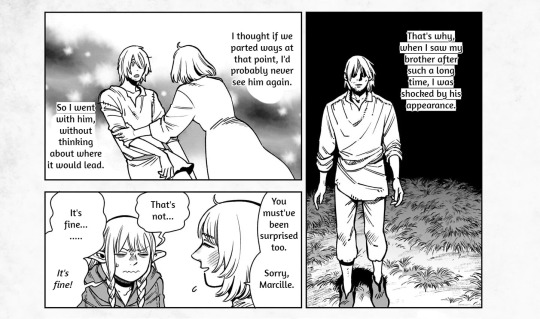
A friend always says that while Falin is the center of Marcille’s world, Laios’ is at the center of Falin’s, and I tend to agree.
It’s fun to think of how her career dreams had always been shaped by Laios, even when they were kids. Of course there’s how traveling the world began as a dream they talked about and shared, but there’s how he reassures her by listing cool jobs she could do like traveling exorcist, etc. And then of course, she gave up on her magic academy and career path to follow him and do odd jobs, etc etc.
I should go into the violence of Faligon more tbh, because I think there’s an interesting parallel to how she has no problem wacking things with a mace, wether a ghost when she was a kid or a walking mushroom as an adult. Something that often surprises fans when they remember, I don’t really want to get into the whole " Falin hates violence and hates seeing people in pain to an intense degree. ‘If you die do it somewhere where I can’t see’ style’ interpretation, it has some weight but on the whole I don’t vibe with the theory she has a particular aversion to violence, she seems to be fine resorting to it as much as any other adventurer as long as it isn’t needlessly against ghosts. And Falin’s sudden mace hits are fun to me too because it’s not her becoming a berserker when the need arises as much as her becoming active because something she cares about is threatened, and that brings her out of her passivity from 99% of the rest of the time. Thistle included. Falin always could be violent, she just dislikes senseless carnage. The Shuro party vs chimera fight is a bit ambiguous on it, because you can argue she only attached after being provoked, presumably offscreen as well while the ninjas went off to fight the harpies. Falin becomes the most active when she needs to protect someone, she has no qualms doing whatever’s needed for that, wether it be leaving the academy & Marcille without notice no matter the consequences or what her parents think, or teleporting the party, etc.
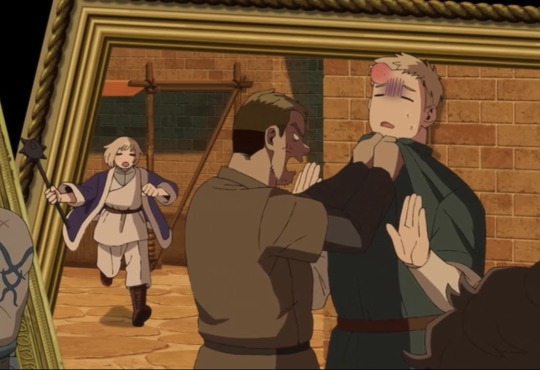
I’m working on a post specifically pointing out all the differences between Falin and Laios, but yes I think both of them selfishly desire freedom in different yet similar ways. Falin’s dark secret is "Ethics and risks are optional if it means I can protect those I love" like the teleportation, and Laios’ is "Ethics and risks are optional if I can be free of all this bullshit" aka humanity aka his wish with the winged lion.
Conclusion
Flighted birds have hollow bones. With freedom and wings there comes risks and sacrifices.
Tldr: Falin doesn’t care all that much, she’s very go with the flow. For example if someone hates her she doesn’t really care because that’d require her caring about what they think of her in the first place, and she only cares about her loved ones. She smiles, but it’s more a state of being rather than out of active goodness: she’s canonically very genuinely kind, but it’s more out of a general want for pleasantness than active care itself. She’s passive, and softspoken because that’s just how she seems, but she has no problem hopping into bushes or getting heated if something calls to her enthusiasm or calls for action and a hit of the ol’ mace. Her loved ones needing tending or protective is what makes her go from passive to active. That familiar autopilot mode of making someone the center of her world and following their every move is what made her so easy to be controlled as the chimera, even ferociously defending him with her life. Faligon is most interesting to me with the theme of freedom. She’s shackled to Thistle and out of her mind, but there’s also a sense of empowerment and freedom from expectations and society. She spends all her time caring for Laios and Marcille alternating that none of her care and emotional energy is left for others, including herself. So she had to get relieved of all of that for a bit, becoming the chimera so she could reset and recenter and remember that she, too, indeed, is there and an important part of her own life. There’s a way of caring after others that can be selfish, not unlike Marcille being overly coddling and not listening to Falin. In Falin’s case, I think it was so selfless that it ended up looping back around to erasing her sense of self. In losing sight of herself, that devotion becoming neither quite selfish or selfless but a fact of life and a state of nature, muddled by its lack of direction.
She’s sooo used to never being able to ask things out of others, you get the crumbs of affection and approval that others offer to you unprompted and that’s it don’t hope for more don’t ask for more. (Also reflected in how she follows her loved ones around without complain or personal opinions and how she’s not willing to rock the boat and affirm herself in her relationships like with Marcille during canon)
Falin cares so much, so much and so laser focused on her few loved ones that it blinds her and she loses sight of everything else, she ends up neglecting herself and the rest of the world. As Kui puts it, Falin is herself first and foremost. She just had to remember the importance of that.
-
I see her as an enneagram 9, which can be surprisingly accurate and fun to research through the lense of Falin. Excerpt below from this book, but like my god, good way to put it
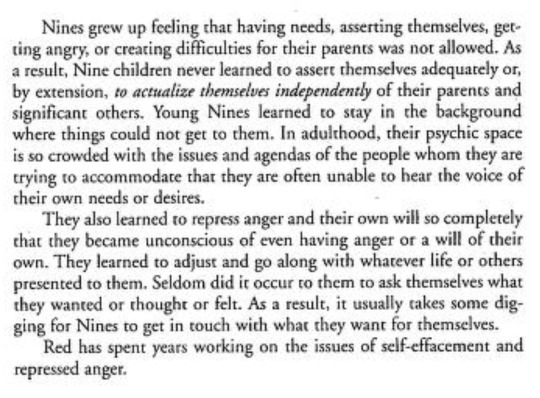
That’s it, ty for reading. Even if it’s a bit of a mess, hopefully you’ll have gained a thing or two from it. Falin is a character hard to pin down, but it is very gratifying when you find the way that the puzzle pieces fit together right for your own understanding of the story. Fantranslation of the shuro proposal comic by @/thatsmimi here.
Here’s my spotify playlist for her if you’d like
Sometimes love is about letting go, a lesson a lot of the cast needed to learn. Self-love’s important too, and just like with diets we need a healthy balance.
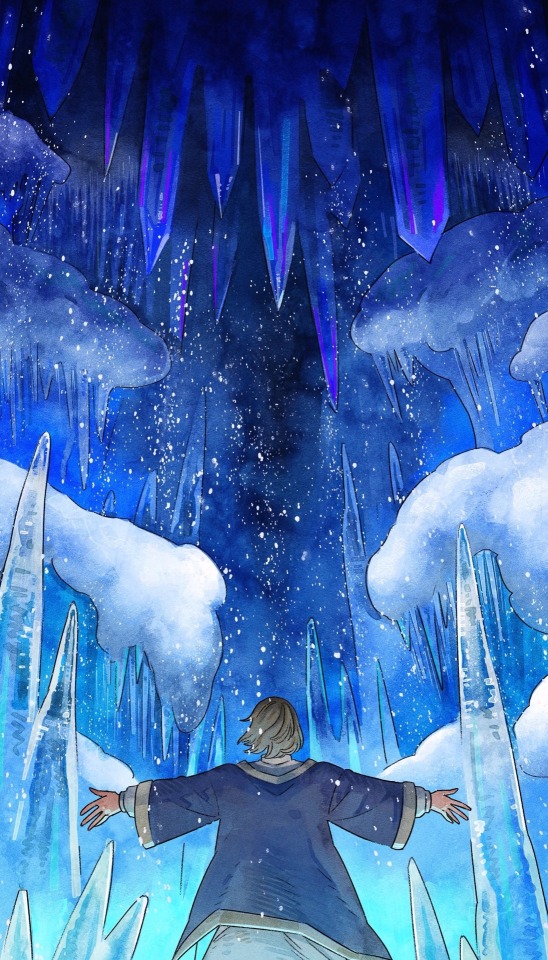
#I find it hard to express myself right on the topic of Falin. Both because the issue is pretty vibe based and because we don’t#get that many moments with her. So there’s ambiguous scenes up to interpretation addressing a layered topic and like. Save me. Save me#As always falling down the rabbithole of starting an analysis about a specific facet and then needing to explain everything else around it#I’m doomed. I’m getting lost in the sauce.#dungeon meshi#delicious in dungeon#falin touden#analysis#character analysis#meta#autistic reading#aroace reading as well. Sort of. It’s mentioned#The aroace autistic guilt of not caring back in the way/with the intensity you’re expected to#As always this is just my interpretation blablabla#Spoilers#dungeon meshi manga spoilers#She loves like a dog aka unconditionally and happy with eating scraps of affection and attention off the floor#Laios touden#he’s here too bc they are an unit#If you’re not capitalizing on the uncanny vibe autistic effect for Falin’s character u are missing an opportunity imo#Fairy’s child is written all over her. Her cryptic-ness is the point so why am I surprised she’s hard to fully pin down#Even with the graveyard scene it was Falin following Laios… Sob. Laios could feel responsible her powers were found out#I’d like to rework this at some point if i get better at structuring. I’m not satisfied by the level of clarity#Will 90% for sure edit stuff in if i find more to say.#Fumi rambles#Crazy style#I give a TLDR at the end if you’d prefer. It doesn’t have the like evidence/explanations alongside but it makes the main points i think
1K notes
·
View notes
Text
"Icarus laughed as he fell, for he knew to fall means to once have soared" is Jason about being Robin
#explan-jason#quotes#poetry#poems#poems and quotes#jason todd#red hood#jason peter todd#jaybin#robin jason todd#character analysis#media commentary#my commentary#blorbo#dc comics#dc#comics#comic books#batman comics#batfam#batkids#batfamily#dc characters#comic characters#batman characters#batboys#robins
191 notes
·
View notes
Text
i can't stop chewing on the MASH time loop situation. my star trek brain will not turn off. there is definitely some kind of temporal anomaly at play, but it's not really a time loop in the traditional sense.
effects carry over from loop to loop. they appear to age. the same wounded soldiers appear on the table three times, but the scars of past surgeries are still there. a character leaves or dies and is gone from the mash forever; their replacement arrives near the end of the war and is still there at the beginning. the dates overlap, yet their presence is sequential. the other characters remember all of them.
how far does this effect extend? if it's summer again at mash, is it summer in tokyo? is it summer in maine? if BJ is in korea two years before he arrived, who's in residency in california, marrying his wife, conceiving his child?
their family trees at home deform—different wives, different children, loved ones alternately dead and alive and never born. those inside are oblivious to what they've lost. hawkeye remembers trapper, but not his sister. what happens in korea persists; the world outside is a fragile suggestion. he tells a soldier that men at the front can't see the whole war, only the other guys dug in with them on their one little hill.
for a deep space nine fan this is irresistible. hawkeye says, wars end, but war is forever. kira asks, if the past has changed, why do i still remember it? sisko never left that ship. time itself is warped by trauma. it is not linear. you exist here. you choose to exist here.
#literally the deep space nine pilot rewired my brain and i will never not see it wherever i can#my tng-style trek science explanation is almost ready to go but i'm trying to make it slightly less babbly#and i know i'll have to update it once i see the rest of the show...#but what is the fake scientific method if not hypothesis-analysis-revision right??#mash#mash time loop#mashblogging
583 notes
·
View notes
Text
one of the things that I found particularly interesting in Demigods of Olympus is that it finally gives the best direct comparison we've seen so far between Percy and another character's experiences in terms of academics and particularly ableist discrimination.

The way Zane describes his experiences and what we see in his POV is that, while he is similarly discriminated against for his "atypical" behavior and blame is placed on him, the only sorts of punishments he receives for this are relatively benign, such as an increase in counseling. (It is also notable that Zane is somewhat autistic-coded, such as having the "incorrect" scripts when speaking with adults and Sam explicitly reminding him to remember to make proper eye contact.) Percy, on the other hand, similarly experiences discrimination for "atypical" behavior, but whereas Zane is treated as "too smart for his own good" and given slaps on the wrist, Percy is automatically labeled as aggressive, destructive, and a trouble-maker based on preconceived assumptions about him and is more severely punished, such as being frequently expelled.
We rarely get this level of direct comparison between Percy's experiences and that of another character, particularly such similar experiences, so looking at the differences is really interesting to gauge what their different experiences with ableist discrimination is like - and how it could potentially tie into intersectionality and other forms of discrimination at play for them.
For instance, Zane's parents are generally heavily implied to be middle-class and/or generally financially secure, versus Percy who grew up poor, so it could be classism in combination with ableist discrimination. Alternatively, it could be intersectionality with racial discrimination, as neurodivergent behavior in people of color is significantly more likely to be punished more severely and labeled as aggressive or disruptive behavior due to racist preconceptions - particularly since we know Percy's experiences with ableist discrimination are also somewhat based on assumptions people make regarding his appearance. Both Zane and Percy are racially ambiguous - Zane's appearance essentially being completely unspecified, but Percy at least having some notable details such as having a deep tan complexion. If not racism, it could also be colorism, which in this context often has similar intersectionality. There's a lot of potential options.
It's just very interesting to me! I love having such a direct point of comparison to examine the experiences of two characters within.
#pjo#demigods of olympus#riordanverse#percy jackson#zane carver#analysis#disability#adhd#one of my biggest gripes with analysis that i see often in the fandom is people erasing Percy's experiences with ableism#particularly academically and instead electing to frame his experiences as ''only possibly being from [x] - there's no other explanation''#which is really sad to me because it just highlights how little people understand what ableism and ableist discrimination look like#and simply seem unable to process our experiences and stories meant to reflect our experiences#so having another frame of reference to compare Percy's experiences against is REALLY nice and particularly fun for me personally#because it gives an opportunity to highlight both the general disabled experiences Percy faces due to his adhd/dyslexia#but also how that potentially ties in to intersectionality with other demographics he's a part of or may be a part of#because now we have a point of comparison between how two disabled characters are experiencing similar discrimination for the same thing#but there *are* differences between them in specific ways that potentially indicate something occurring in addition to just ableism#which is fascinating! and allows those discussions in the context of intersectionality WITHOUT erasing disabled experiences! yippee!!!#anyways this is mostly off the noggin since ive just been rotating the thought for a couple of days#chewing on this chewing on it chewing on it
148 notes
·
View notes
Text
so I was fine with bigeneration happening to the doctor cause it was a myth and he's not a time lord. (It could also be an influence of the toymaker but I'm okay if it's not. It's something that no one has experienced before cause it's rare and the doctor doesn't even know what species he is. Weird stuff can happen). But it happening to the Rani? I was kinda mad watching the episode cause why are suddenly time lords bigenerating? Wasn't it supposed to be so rare that it's a legend? So I thought about it. Pondering. I found a way around it to make it make sense. The Rani is a scientist first of all. What if she sampled the doctor's DNA and used it to give herself the ability of bigeneration? She would surely drabble in an experiment like that and would find useful to have two of herself. This made me less confused and mad, I hope it gets explained though, for now I have this theory. However I still don't know why the older rani is ok with the newer rani treating her like that. seems very out of character? Why would she let herself be ordered around? Also why does the rani want to terrorise the doctor? She's not some villain that just wants kill the doctor, that's not her motives. Sure, they're enemies, but only cause the doctor is always trying to stop her, not cause she hates him personally. She cares about science, and her experiments, and discovery, not destroying worlds. Also why is she paralleling the doctor? Why did she introduce herself with "The definitive article"? That's something the master would do, copying the doctor, not the Rani. I just really hope she doesn't get boiled down to a generic finale villain or worse, they give her the master's role
#very worried about how they're gonna handle her. i hope im wrong. i hope there's an explanation and shes amazing as usual#the interstellar song contest#doctor who spoilers#the rani#mrs flood#doctor who#character analysis#i should make a real tag for this that isn't the character analysis one where i just mix up everything
125 notes
·
View notes
Text
Whenever I think about the airport scene and how people try to argue that Mikes acting awkward because him and Will haven’t spoken in a while I just think of how silly that is. It makes me think of my own long distance best friend. I’ve known her since 1st grade and moved away after highschool. Yes we keep in touch more but that’s literally because it’s easier now than it was in the 80s. There has been a time when it’s been a full year since we’ve seen each other. You know what we didn’t do when we saw each other again? Act all awkward and awkwardly hug. It felt like no time passed because we’re BEST FRIENDS. If Mike and Will are supposed to just be best friends why is it any different. I think we know why and people who try to argue different just don’t wanna admit how weird Mike was acting at the airport. I mean come on. Will was acting normal and only started acting weird after Mike did.
#byler#mike wheeler#will byers#stranger things#byler analysis#byler proof#mike wheeler i know what you are#mike is in love with will#the airport scene is one of the biggest proofs of byler#there is no heterosexual explanation for it
108 notes
·
View notes
Text
The meaning behind this artwork (by me!) :

This drawing was inspired by the Mitski song Your Best American Girl. Specifically the line “Well, I’m not the moon I’m not even a star,”. Within the context of this artwork that line is very literal.
This is based in a reality where there are star-hybrid beings (shown as the fetuses) who are seen as special and treated as higher beings. The moon is viewed as a God in this reality and decides who is special or not.
The main figure is human and not a star-hybrid but they really want to be, which is why they are dressed as a star. The star hood and outfit is based off of jesters attire. The reason being, they are seen as a joke and will never be viewed as a “real” star by others.
The moon has a red string wrapped around its little fingers referencing the Chinese legend of the red thread. (Although in this case it means their destiny as a whole and not marriage/relationships). By this I mean that the moon has a greater plan for the main figure- they just aren’t aware of it yet.
Basic concept of these beings/reality:

#does this even make sense#ramblings#analysis#artists on tumblr#art#digital art#my art#artwork#draw#drawing#artist#surrealist art#fantasy art#art explanation#art analysis#stars#mitski#explanation#oc#oc art
130 notes
·
View notes
Text
Like every couple in the world does, Bob and John happen to fight sometimes. Most of the time, their quarreling starts over something outright silly: maybe a misunderstanding, maybe one of them being a hot head and the other being even more of a hot head. But the thing with John and Bob is that when their arguments aren't that serious is when they get so fucking petty.
The aftermath of their lover's spats can only be described as immature. They sleep in their respective rooms, instead of both staying in John's like they usually do.
When they're in the same room, John rolls his eyes and pretends not to listen to Bob talking to someone else, and Bob straight up parrots John when he's in a serious conversation, mimicking his movements and all too.
Bob talks Yelena's ear off about how annoying John's behaviour is, and she doesn't hesitate to remind him that he's doing the exact same as his boyfriend. "You're so similar, it's gross", she tells him, and he just shakes his head and goes back to his complaining.
John drops some comments about Bob still not coming to his senses to Bucky, trying to sound disinterested and only mildly pissed about it. Bucky, without missing a beat, tells him he's being ridiculous.
When the irritation wanes, they finally admit to themselves how much they crave each other's presence.
That's when they start to quietly get closer again. First they'll sit side by side on the sofa or in the car. They still don't say anything, but they want the other to be besides to them.
Some time after that, they slowly start to talk to each other again. It's just small sentences, and because they're so embarrassed of the way they acted the previous days, they sound incredibly awkward. But it's a sign they both are getting tired of being apart.
One day, at breakfast, John hands Bob milk for his coffee before he can ask anyone for it, because he knows what his boyfriend wants in whatever situation by now. He reads the news on his phone out loud, because he knows that Bob likes it when John makes an effort to keep him informed. He affectionately squeezes Bob's shoulder when he passes behind his chair.
The same night, after dinner, Bob goes to knock on John's door. When John comes out, slightly wide-eyed and with a face that's definitely hopeful, Bob doesn't even let him speak. He just asks, a little sheepishly, if he can come in.
John of course lets him in. Of course he hugs Bob from behind the moment he gets through the door, his arms wrapping firmly around his torso and waist. Of course Bob squeezes John's arms tight in his hands, bringing him even closer to his body.
"I'm so sorry" he whispers, his voice shaking just slightly. It doesn't matter if he's responsible for their argument or not. They both don't remember what it was all about anyways. Bob knows John feels the same, without even needing to hear him say it back.
"I've really missed you." John's voice is filled with relief, like he's just stopped holding his breath after a long time. He knows Bob did too, so they don't let go of each other until the morning comes.
#your honour#in my defense#i love these morons#there's no other explanation#sentryagent#voidwalker#bob reynolds#john walker#thunderbolts#thunderbolts*#bobjohn#us agent#the sentry#the void#headcanon#bobwalker#bob x john#my ramblings#job as in john x bob not a real job i don't have it#gay brainrot disguised as character analysis
54 notes
·
View notes
Text
ATEEZ Lore Character Analysis/Explanations
Hello! Here is where you can find all of the character breakdowns for the Ateez lore. Each breakdown focuses exclusively on that member's parts of the story and the general themes they represent and grapple with. For the time being, they cover Fever-Golden Hour Part 2 but I may update them as we get more parts of the story. (I will change this text if I do)
Hongjoong the Captain
Seonghwa the Investigator
Yunho the Brother
Yeosang the Tinkerer
San the Nomad
Mingi the Loner
Wooyoung the Performer
Jongho the Loose Canon
Release order was decided by this poll and ties were broken by friends of mine! Enjoy and send in any questions or comments you have :D
Analysis is written from my mind based exclusively on the direct source material. Thoughts are collected from annotations in my copy of the Dear Diary book! Special thank you to ateezstoryline.com for transcriptions of the Fever Part 1 Diaries and the Golden Hour Diaries, both of which are not included in Dear Diary <3
#ateez#atiny#lore explanation#ateez lore#ateez lore explanation#ateez character analysis#ateez character breakdown#atz#seonghwa#hongjoong#yunho#yeosang#san#mingi#wooyoung#jongho#character breakdown#character analysis
77 notes
·
View notes
Text
Quick analysis video of Sevika I always wanted to do!
More of these coming soon! Enjoy💥
#arcane#Pause for some of the explanations!#arcane series#arcane lol#arcane netflix#sevika#sevika arcane#arcane sevika#arcane s2#season 2 arcane#arcane season 2#s2 arcane#jinx arcane#arcane jinx#arcane analysis#film analysis#animation analysis#analysis#honedtly getting tired of not seeing any other conversations about sevika#so happy i got around to doing this
61 notes
·
View notes
Text
Jason has the opposite of fatherless behavior. He's known his fathers and so now he's like that. Father-full behavior, if you will.
#explan-jason#jason todd#red hood#blorbo#batfam#batkids#batfamily#dc comics#character dynamics#bruce wayne#batman#willis todd#jason and bruce#jason and willis#comic books#dc#comics#dc characters#comic characters#batman characters#character analysis#media analysis#media commentary#my commentary#funny#jason peter todd#jason todd wayne#the red hood#humor#wordplay
79 notes
·
View notes
Text
I'm not saying making tentatodd sexy (as in like, a crossover between a mermaid and glossy black octopus-y tentacle porn monster) would have fixed Nightwing Brothers in Blood... but it would have made it much better
#sometimes when I talk about demonization of mental illness it's narratives that imply the illness/trauma makes the bad guy evil#and there's nuance to be explored in the analysis like how much of it is demonization what explanations do we get etc#but sometimes#sometimes the mentally ill character having an episode transforms into a literal ugly ass monster that eats people#and I'm like what do you even want me to say to this#i know why some of y'all enjoy it and I get it BiB has a great premise it could have been great#personally there's other stuff I dislike in it but I get it#but jesus fucking christ who thought the tentacle monster was a good idea#at least make him sexy!!!#(i'm not kidding that would have mitigated the demonization.#best version is no tentacle monster but if there is a tentacle monster at least make it hot)#dc#jason todd#dc comics#red hood#nightwing bib#nightwing brothers in blood#tentatodd#anti nightwing brothers in blood#also to me jason is either a bottom + sub or aro i don't see him doing anything at all with the tentacles#but HE COULD
76 notes
·
View notes
Text
What it means that Till likes Mizi because she's "pretty"

Fans hear Vivinos & QMENG answered in a nonchalant manner that Till liked Mizi initially because she's pretty and conclude his love is shallow and vain. But this doesn't refer to external appearance alone but rather how her internal beauty shows on the outside.



In the free Patreon post ABOUT <Drowning Bloom>, it's explained:

Till is seeking authenticity and someone who shares his values of beauty, nature, kindness, love, etc. He finds her pretty the same way he finds flowers pretty:

The same Patreon post describes Till as:

When Till likes Mizi because she's "pretty", it refers to her smile, her warmth, her kindness. Mizi is one of the first people to show him kindness after he arrived at Anakt, and she is always kind to him.

A different Patreon post explains:
Till actually doesn't know Mizi very well. It's simply her smile that makes Till willing to risk everything for her and sing; this shows his pure nature. He's just a boy experiencing the innocence of first love.
Till resolves to protect her because he doesn't want her brilliance to be dimmed by anyone or anything.

But he fell in love with her at first sight
Till isn't wrong that he "felt a spark" between them on their first meeting. Till is an INFP (Fi, Ne, Si, Te) and Mizi is an ESFP (Se, Fi, Te, Ni). Till has Fi primary while Mizi has Fi auxiliary and that's likely what he felt. He could tell she values the same things he does, and for that reason she would be able to understand him. Because they're alike. However, because his Fi defines who he is whereas Mizi's is a skill she has to develop and does not easily go to, perhaps that's why she did not feel the same way.
If she were gloomy, if she were mean, he would not like her because she's "pretty." He would look elsewhere for someone who could understand him.
#alien stage#alnst#alien stage till#alnst till#alien stage mizi#alnst mizi#mizitill#tillmizi#alien stage analysis#alnst analysis#this is the post I'm missing for explaining how Mizi's his coping mechanism#apparently I already had it all written just had to organize#this is how I know he wanted to /create/ a reality where she didn't have to suffer#I'll post the other one that needs all these explanations in a little bit lol#the picture of Till with the flowers is from the drawing book but this isn't my picture it was already being spread around so ¯\_(ツ)_/¯#also I know those first screencaps are from the error : no better options I'll explain that and R2 later maybe next week idk#also also no one start with me about Till in the true face comic unless you have a thorough *cited* explanation for why everyone is so ooc
35 notes
·
View notes